Leaders and other influential people in politics, culture, and science are undoubtedly able to shape human history, though it is debatable to what extent.
Russian President Vladimir Vladimirowich Putin has certainly made his mark and he will be remembered not only as the most important Russian politician since Khrushchev, but also as the most adept and competent world leader of the early 21th century. Even as he is demonized in Western media, nobody doubts his dominance, authority, and effectiveness.
For example: Russia’s engagement in Syria until now has been successful. Russian air support helped Syria to defeat the Islamic insurgents (Aleppo, Deir ez-Zor, Eastern Ghouta) and recapture much of the countries territory.
Using Syria as a live experimental battlefield, Moscow was able to show its military capabilities and gain invaluable lessons from the results of newly developed weapons. Damascus agreed to sign a 49 year contract about the naval base in Tartus and the military mission will boost Russia’s economic role in Syria relating to the exploitation of energy resources and the reconstruction of the country.
The main motive to join the Syrian war though may have been, that Putin decided to pursue his Chechen jihadi enemies all the way to Syria and to defeat them there. Reports of Russian military intelligence first go directly to the Kremlin. Putin reads them; he is a micro-manager. There will be no Brezhnev-style Afghanistan disaster in Syria, no unauthorized retreats, no Kremlin lethargy. Russian officers speak good Arabic and, like in the Syrian army, the officers go to the front lines and lead their troops from there.
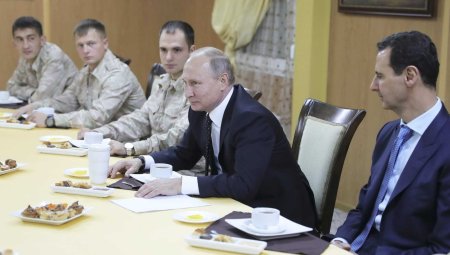
Putin tries to keep the costs low and avoid risks. Despite taking sides and saving Syrian President Dr. Bashar al-Assad, he remains on relatively good terms with Israel, Iran, Turkey, Egypt, Lebanon, Saudi Arabia, the UAE, and other Arab monarchies.
In the political arena, Russia plays a vital role in the Astana talks with Turkey, Iran, and Syria, which impose themselves as a real and efficient alternative to Geneva.
The Middle East is in turmoil and things can change fast. Saudi Arabia will have to bail out Jordan with a 2.5 billion US$ five-year aid program after massive protests against austerity brought down the Jordanian government and threatened a collapse of the Hashemite kingdom. In Iraq Muqtada al-Sadr forms a coalition with the pro-Iranian Fatah Alliance, opposed by the West. A genocidal war in Yemen rages on, and Qatar is still embargoed, supported by Turkey and Iran, who reap political benefits.
The Syrian war is winding down, fewer civilians died in May than in any other month since the outbreak of hostilities in 2011, though with 244 civilians killed across the country it is still a tragedy that should end as soon as possible.
During his annual televised call-in show Putin said, that Russian troops “will stay there for as long as it is to Russia’s advantage, and to fulfill our international responsibilities,” adding: “we are not building long-term installations and if necessary can withdraw our servicemen quite quickly without any material losses.”
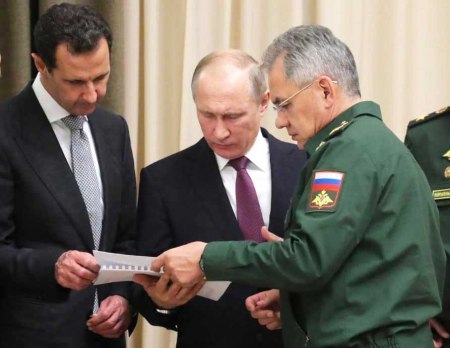
Putin tries to end the war, his Western adversaries apparently try to keep it going.
In April 2017 the United States and its allies launched 59 “disciplinary” cruise missiles against Syria’s Shayrat Airbase in response to an alleged nerve gas attack in Khan Sheikhoun. This April the Western powers sent 104 more cruise missiles to the Barzah research center and several airbases in response to an alleged nerve gas attack in Douma.
Syrian air defenses have intercepted a number of these missiles but there are contradicting claims or estimates how many. Russian air defense systems didn’t get involved, though there are reports that jamming by Russian electronic warfare systems caused some cruise missiles to fail.
Numerous air-defense systems safeguard Russia’s Hmeimim base near Latakia plus its naval logistics facility in Tartus and offer protection for the jets during air operations against Islamists.
Deployed are Pantsir-S1 (short range), Tor-M2 and Buk-M2 (medium range), S-400 (long range), and Krasukha-4, Khibiniy-U, Richag-AV electronic warfare systems (jamming, disabling electronics of enemy UAVs using nanosecond electromagnetic pulses, ground electromagnetic pulse generators).
It sounds impressive, but defense experts have repeatedly questioned the capabilities of these systems due to their lack of engagement during multiple air strikes on Syrian regime targets conducted by Israel, the US, and their allies.
Israel bombs Syria
The IAF (Israeli Air Force) has intermittently attacked Iranian weapons shipments in Syria in the past, stressing it will not allow Iran to arm militias and Lebanon’s Hezbollah.
On April 9 Israel escalated and targeted Syria’s T-4 airbase, killing 14 soldiers, 7 of them Iranians. On April 29 the IDF did hit again, targeting mainly air defense installations (Pantsir-S1 and S-200). Until now Israel has conducted more than 100 airstrikes in Syria and has suffered only one known loss: an F-16 was brought down in February by the Syrian army in what Israel claimed was a crew error.
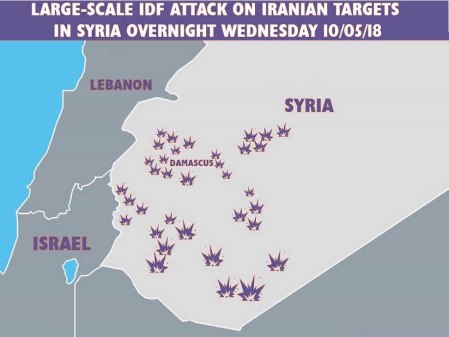
Cold blooded and deliberately, the government in Jerusalem thus ended its “deconfliction” arrangement with Russia which was negotiated between Putin and Israel’s Prime Minister Benjamin Netanyahu in September 2015. The agreement gave Israel a free hand against weapons transfers from Iran to Hezbollah and allowed continued Israeli deterrence on its northern border.
The Israeli aggression nevertheless will not end the cordial relation between Putin and Netanyahu, and history explains why this is so.
When after the 1967 Six Days War the Russians did commit themselves wholeheartedly to one side in the Arab-Israeli conflict — backing the Arabs diplomatically, arming them, sending a strong military force to defend Egypt in 1970 from Israeli air attacks, and breaking off diplomatic relations with Israel — the result for Moscow was a catastrophe.
The USSR’s large Jewish community became alienated, the USSR found that by making an enemy of Israel it had further poisoned its relations with Western powers at precisely the time when it was seeking detente, and the USSR quickly discovered that its Arab allies in whom it had invested so much were both ungrateful and treacherous, so that by 1980 the USSR’s position in the Middle East completely collapsed.
The final straw came after the Soviet intervention in Afghanistan in 1979, when volunteers from across the Arab world rushed to fight the Russians in Afghanistan, with a dedication that they had never shown in the struggle against Israel on behalf of the Palestinians.
Not surprisingly, the Russians have therefore since the mid-1980s been determined never to become directly involved in any part of the Arab-Israel conflict again. Anyway, after Saudi Arabia became an Israeli ally in all but name, the Palestinians are practically on their own and Arab nationalism is at a dead end.
Russia has not intervened against Israeli attacks and has refused to give Syria S-300 anti-aircraft systems, thought it has brought in dozens of new Pantsir-S1.
Israel justifies the attacks with the need to curb Iranian influence in Syria. Iran is depicted as an existential threat to Israel and it supports Hezbollah, which deters Israel from seizing the water-rich Litani basin in southern Lebanon.
Israeli energy minister Yuval Steinitz warned, that Israel will assassinate Syrian President Bashar al-Assad if he continues to allow close ally Iran to operate in Syria. This is not an empty threat, Mossad has assassinated at least four Iranian nuclear scientists and carried out more than 2,700 other assassinations (details in: Rise and Kill First by Rosen Bergman).
The frequent contact between the Russians and Israelis in the last weeks triggered rumors of a “secret Russian-Israeli deal” to push pro-Iranian militias from southern Syria.
President Putin was speaking about a withdrawal of all foreign troops during his Sochi Summit with President Assad, and Russia’s Special Envoy to Syria Alexander Lavrentiev shortly thereafter elaborated on his boss’ suggestion by confirming that “this includes the Americans, Turks, Hezbollah, and of course, the Iranians.”
Russian Ambassador Vasily Nebenzya announced, that an agreement between Russia and Israel about the withdrawal of Iranian military advisers and Hezbollah fighters from the southern regions of Daraa and Quneitra near the Golan Heights has been reached. The pullout of Hezbollah is already happening and has been confirmed by local sources.
Things don’t always go smoothly. When Russian troops deployed near the town of Qusair at the Lebanese border to replace Hezbollah, the Hezbollah commanders objected and the standoff could only be resolved, when Syrian Soldiers from Division 11 moved into the disputed positions. Leader Hassan Nasrallah said publicly that Hezbollah will remain in Syria as long as Bashar al-Assad needs it there.
Russia, as a self-appointed but seemingly mutually accepted middleman between Israel and Iran, is engaging in talks with both sides, seeking the least painful option for both. Russians are not negotiating behind Assad’s back, both Hezbollah and the Iranians continue to be informed and consulted. Iran officials themselves publicly indicated they wanted a deal in Syria with Israel and were seeking Russian help and mediation.
Sheikh Sadiq al-Nabulsi, a Lebanese-born religious scholar, who is close to Hezbollah, outlined in an interview with the daily Kommersant a possible Moscow-guaranteed deal: Hezbollah and other pro-Iranian forces would move away from the IDF positions in the Golan Heights, while Syrian and Russian forces would move into rebel-held parts of Daraa and Quneitra provinces. At present, this portion of Syria is within a so-called “de-escalation” or “safe” zone, guaranteed by Russia, Jordan, and the USA.
Israel also wants a guarantee, that Iran will not deploy anywhere in Syria long-range weapons (missiles) that may possibly threaten Israel.
Whatever may happen, the military and economic help from Iran during the war has created personal ties and sympathies which cannot be erased by a deal between Putin and Netanyahu, in other words: Iran will remain an important player in Syria even if Iranian troops leave.
President Assad has called on Iran to participate in the countries reconstruction, Iran was granted a license to become Syria’s third mobile communications provider, Iran and Syria will convene a joint committee to sign a document for strategic, long-term cooperation.
Special Russia Israel relations
Russian interests are not completely aligned with those of Syria, there are major and maybe even irreconcilable differences regarding relations with Israel, Turkey, the Kurds, Iran, and about Russian investment in Syrian oil exploration.
While Putin accepts the praise of Bashar al-Assad for saving Syria from the jihadis, he calls Israel’s openly racist defense minister Avigdor Lieberman “brilliant.”
Lieberman, who btw is a former nightclub bouncer from the ex-Soviet Union, and other top Israeli officials met on May 31 with Russian Defense Minister Sergei Shoigu. The primary focus of the visit was the situation in Syria and specifically, in Lieberman’s words, “the entrenchment of Iran and its proxies” there.
At the St. Petersburg International Economic forum on May 24/25 Putin said two completely unexpected things: first, that Iran should remove its forces from Syria and second, that Israel has a right to defend its borders.
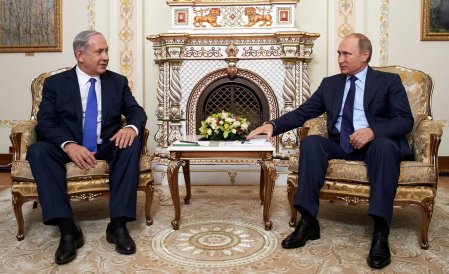
One has to consider, that Israel has a powerful pro-Israel lobby inside Russia. There is a sizeable minority of patriotic Russian Jews and they are an integral part of Russian culture and history. Likewise there is a substantial Jewish diaspora in Israel which still feels connected to their former homeland.
Israel just recognized Victory Day (May 9) as its own national holiday. A third of Israelis are in fact of Russian origin, and a lot of them felt very proud to be Russian that day, taking part in big parades that were broadcast on Russian television. In the face of a rising wave of antisemitism in Europe and with neo-Nazis running amok in the Ukraine, Russia and Israel stand united. A US Jewish publication rang the alarm bell: “Violent Anti-Semitism Is Gripping Ukraine — And The Government Is Standing Idly By.”
Then there is the Word War II factor, which Israelis and Russian Jews have been extremely skilled at exploiting to the max: Russians and Jews are united in a common memory of the horrors the Nazis inflicted upon them and they also often sense that West Europeans and US-Americans are maybe not quite as sincerely sympathetic to their plight even if political correctness forces them to pretend to be.
As a result, you will find that most anti-Zionist Russians, while surely not “ADL (Anti-Defamation League) compatible” in their views, hate the Nazis and everything Western racism stands for no less than Jews would. If fact, when faced with the modern wave of rabid Russophobia, many Russians say “we are the new Jews”, meaning that everything evil on the planet is blamed on them regardless of fact or logic. Like it or not, but common memory and sentiment does bind Russians and Jews in a profound way.
When Russian billionaire and Chelsea football club owner Roman Abramovich, who, like many of his fellow oligarchs, is Jewish, faced unusually long delays in renewing his UK visa, he flew to Tel Aviv and received documents confirming his status as an Israeli citizen. He has reportedly bought a former hotel in Tel Aviv.
Israel grants citizenship to any Jewish person wishing to move there and a passport can be issued immediately. Israeli passport holders can enter the UK without a visa for short stays, although they require visas to work.
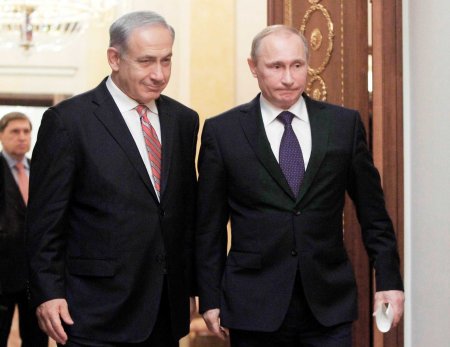
Though the soft stance against Israel can be easily explained, it risks encouraging Washington and the NATO allies to start a decisive escalation, because “Putin has blinked” and “Russia has shown itself to be a paper tiger.” The price of the current appeasement could be a radically reduced maneuvering space and an exponentially increased danger of a lethal escalation.
Eventually Russia may be forced to respond to the ever-escalating provocations. Putin, a judo black belt, will certainly use the weight and strength of Russia’s opponents to throw them off balance rather than opposing them in a direct confrontation.
Will that be enough to avoid a deadly showdown?
Nothing new in Russia
This is Putins fourth and most likely also last term in office.
After his resounding victory in the presidential election with 77 percent of the votes Putin surely had a mandate to get rid of the Western friendly liberals (called by some pundits “Atlantic Integrationists” ) like Alexei Kudrin and Dmitry Medvedev. But he reappointed Medvedev, Kudrin became Chairman of the Accounts Chamber of Russia, Konstantin Chuichenko became the government’s chief of staff plus deputy prime minister, and Vitalii Mutko became Deputy Prime Minister in charge of construction.
Chuichenko is a confidant of Medvedev, Mutko is blamed for the gross mismanagement of the “Russia doping scandal” controversy and is absolutely despised for his incompetence.
The big expectation that, with a strong personal mandate from the people, Putin finally would kick the liberals out of the Kremlin has been unfulfilled. Putin actually appears more concerned about maintaining a balance between multiple vying clans in his court.
Yet, one has to admit, that the Medvedev government has done a decent job in regard to the economy. There would have been better economic policies available, but nobody can argue that the government completely failed.
Also important: Putin values loyalty, and Medvedev undoubtedly has been loyal, and that over many years and in constantly changing scenarios.
Lavrov and Shoigu are both staying, Sergei Glazyev is still economic advisor. Glazyev’s program of ending Russia’s dependence on foreign markets and the dollar by returning to partial convertibility of the ruble, prohibiting free capital transfers abroad to stop flight, and achieving a mobilization breakthrough at home will maybe getting a chance if Western sanctions continue.
In his annual televised question and answer session on June 7 many people asked why Putin didn’t clean house after his reelection and instead reappointed mostly the same people to same or different ministerial positions within the government, prime minister Medvedev in particular. Putin’s explanation was that these were the people who had spent the previous year or more planning the breakthrough, the great Russian leap forward, that is scheduled to occur over the next six years — Putin’s “six-year plan” — and that two years would be lost if they were replaced with new people who haven’t been part of the process all along. The task before them is known; they have accepted the challenge. “Personification of responsibility” is a phrase Putin repeated three times. “Personal responsibility must be absolute,” he added.
Has Putin lost it? (The economy)
Putin is a pragmatist and not an ideologist; he is not per se against globalization, capitalism, and consumerism.
It seems that Putin does not break with the West, because he believes that Russian economic development is dependent on Russia’s integration with the industrialized countries. This is what neoliberal economics tells the Russian economic and financial establishment.
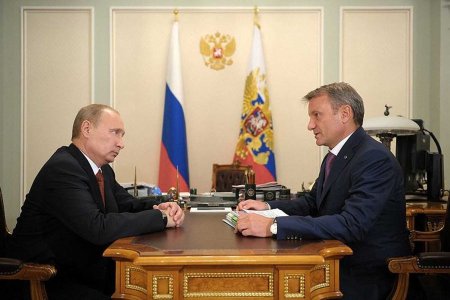
Vladimir Putin’s speech at the already mentioned St. Petersburg International Economic Forum documented again his ensnarement by neoliberal economic policy. Putin defended globalism and free trade, stressing that the door remains open for integration into the Western economic system.
Consequently, Putin continues to accept provocations and humiliations in order to avoid a decisive break that would cut Russia off from the West. In Washington and the UK this is interpreted as a lack of resolve on Putin’s part and it encourages an escalation in provocations that will intensify to ultimately force Russia’s surrender.
Neoliberal economics expose Russia’s currency to speculation and manipulation. Capital inflows can be used to drive up the value of the ruble, and then at the opportune time, the capital can be pulled out, dropping the ruble’s value and driving up domestic inflation with higher import prices, delivering a hit to Russian living standards. Washington has always used these kind of manipulations to destabilize governments.
Neoliberal economic theories have also created the belief that Russian economic development depends on foreign investment. This erroneous belief threatens the very sovereignty of Russia. The Russian central bank could easily finance all internal economic development by creating money, but central bank head Elvira Nabiullina thinks that if the bank finances internal development the result would be inflation and depreciation of the ruble. The central bank is borrowing abroad money it does not need in order to burden Russia with foreign debt which requires interest payments to Western firms.
If Russia borrows dollars, it cannot spend them domestically to finance development projects, so the dollars go into Russia’s foreign exchange holdings and accrue interest for the lender. The central bank then creates the ruble equivalent of the borrowed and idle dollars and finances the project. The USA in turn can use the dollar debt to exercise pressure and influence Russian economic decisions.
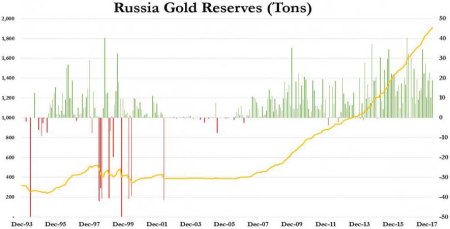
There are signs that Putin is hedging his bets. Russian oil deliveries to the EU have dropped 40 percent while exports of Russian oil to China have risen about 30 percent. India has received its first ever tanker shipment of liquified natural gas from Russia and there are plans to boost Indian LNG imports to 70 million tons annually.
Russian gold reserves have reached 1,910 tons. Since 2009, Russia has added over 1,100 tons of gold to its reserves — more than China which added about 775 tons during the same time. Russia has been buying up more of their gold mining production, in effect converting rubles into gold. Russian gold mining companies are planning to double production; such an increase would make Russia the world’s second largest producer of the precious metal.
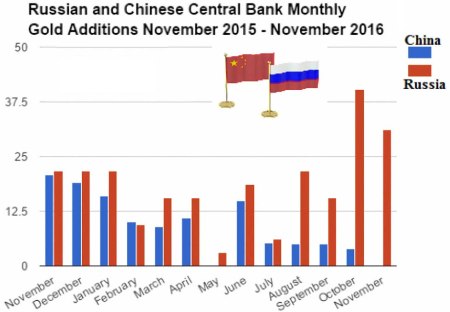
The Russian Central Bank announced that it would start buying gold on the Moscow Stock Exchange. Russia has the fifth largest gold reserves of any nation, this will be a useful asset if the petrodollar hegemony comes to an end.
Since six years Moscow has been constantly selling US Treasuries.
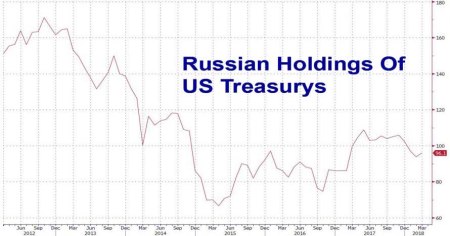
Has Putin lost it? (The oligarchs)
Putin’s power base are the Russian people, not the oligarchs, as Western pundits allege, and yet there is no decisive move against the oligarchs.
In the 1990s it was obvious that the actual power in Russia lay not with Boris Yeltsin but with the oligarchs backing him. The late Boris Berezovsky preferred to provide the impression he ran the nation during Yeltsin’s frequent absences resulting from coronary heart issues or alcoholism and that he had handpicked Vladimir Putin as the subsequent chief.
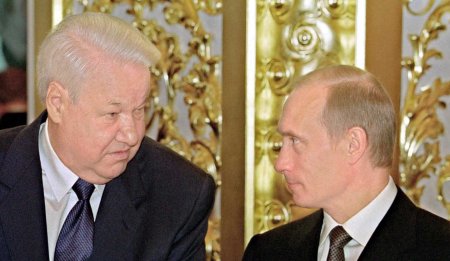
Putin shifted the power dynamic in his first years in office. Berezovsky and Vladimir Gusinsky, who challenged him through their TV channels, were forced to flee. Mikhail Khodorkovsky, who dared to take on Putin politically, was jailed for a decade.
That turned most of the other oligarchs into supplicants working under an unwritten rule: They are allowed to maintain their wealth in exchange for staying out of politics and supporting Russia’s economic development.
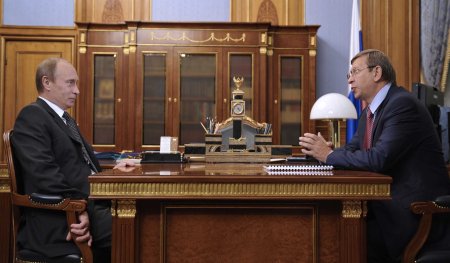
Putin has the means to crush the oligarchs but he will not do it because some of them are his longtime friends, like the Rotenberg brothers, Sergei Ivanov, and Gennadi Timchenko. Their companies prosper because of lucrative government contracts (the Kerch bridge to Crimea for instance was built by Arkady Rotenberg’s Stroygazmontazh). Roman Abramovich, winner of the Aluminium wars and owner of the worlds second largest superyacht, is seen as personal banker to the Kremlin. His personal ties to Putin are said to be excellent.
It is surely not too harsh to label this as cronyism, even if Putin doesn’t enrich himself.
Has Putin lost it? (Western hostility)
Since the 2014 Maidan putsch, which overthrew the Ukrainian government, there is a constant drumbeat of Ukrainian provocations against Russia, and Russia has been saddled with economic and political sanctions by the USA and the EU, supposedly in response to the annexation of Crimea and the unsettled conflict in the Donbass region.
Yet Russia remains Ukraine’s largest trading partner. Not only does Russia continue to trade with the Ukraine, but it has also absorbed an exodus of economic refugees from the collapsed Ukrainian economy which numbers in the millions. Russia has resettled these refugees, allowed them to find work, and is allowing them to send money back to their relatives in the Ukraine. Also, Russia has declined to give political recognition to the two separatist republics in eastern Ukraine.
Russia retaliated against Western sanctions with counter-sanctions on food and raw materials, but has continued to trade with all of the countries involved. In particular, it has continued to supply the Baltic states with electricity.
Russia could for instance block the sale of titanium parts without which Boeing wouldn’t be able to build its planes or could prohibit the sale of rocket engines to the US, which are needed to launch satellites.
Despite all bellicosity and humiliation, Putin keeps the door open. He probably hopes that in the long run the continuous US aggression will alienate Washington’s European allies, who bear the brunt of the economic warfare. Trump’s trade wars could be very helpful in this respect (the EU just announced that it would cease trade negotiations with the US and slap retaliatory tariffs on 3.3-billion US$ worth of US products).
If Putin’s bet doesn’t pay off, the effect of Russia’s restraint will be though, as stated before, a steady escalation with the goal to bully Russia into submission.
Has Putin lost it? (The environment)
Putin is not an environmentalist, he believes in climate change, but doesn’t think it is man made. He also believes in continuous economic growth, and he has no qualms to promote nuclear energy all over the wold.
Russia’s huge landmass and enormous wealth in natural resources make it one of the main purveyors of economically essential products to the world, especially oil, gas, coal, and uranium.
Russia provides Western Europe with natural gas and intends to become a major provider of fossil fuels to China. Russia has developed an exploration method, using ammonium nitrate, as alternative to fracking (hydraulic fracturing). Oil exploration in the Arctic is increasing, both on land (Yamal-Nenets field) and offshore at the world’s first stationary Arctic platform (Prirazlomnoye field).
Despite environmentalists arguing for a carbon tax, the Russian energy and finance ministries agreed with oil companies to start cutting the export duty on crude gradually, to bring it from the current 30 percent to zero over the next six years.
While various Russian regions witnessed the results of climate change over a period of several years and were hit by resulting catastrophes (Central Russian forest fires in 2010, floods in the Far East in 2013 and in the Altai in 2014), measures to reduce fossil fuel consumption enjoy little public support. For Russians, the issue is too abstract, too global, and its manifestations are not visible to all. Interest and a willingness to address environmental problems that are both near at hand and more obvious (air / water / soil contamination, car traffic, polluting plants and factories) have increased in recent years, but climate change is of little interest to Russians.
The dangers of nuclear energy are not a matter of public discussion either. There are 35 operating reactors with a combined capacity of 26,983 MW. Originally licensed for 30 years, most have been upgraded to extend the lifetime by another 15 years.
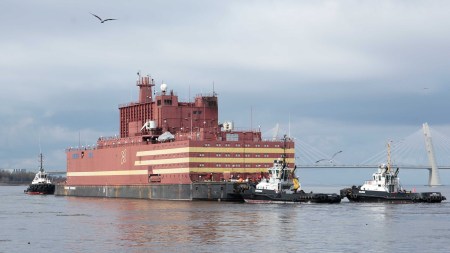
In Saint-Petersburg on April 28 Russia launched the world’s first floating nuclear power plant Akademik Lomonosov with two reactors capable of producing 70 MW. It will be towed for fueling in Murmansk, and then go on to provide power to the Arctic town of Bilibino in the Russian Far East, where the local nuclear plant is due for decommissioning in 2019.
Greenpeace calls it a “Chernobyl on ice,” and environmentalists are deeply worried about an eventual large scale radioactive contamination of the worlds oceans which would dwarf the Fukushima disaster and endanger health and life of everybody.
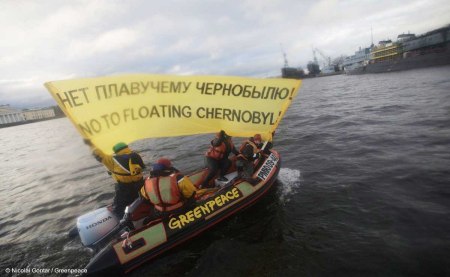
On many of Putin’s foreign state visits he acts as a salesman for Rosatom, Russia’s state nuclear corporation. Exports of nuclear goods and services are a major Russian policy and economic objective. Over 20 nuclear power reactors are confirmed or planned for export construction. Foreign orders totaled 133 billion US$ at the end of 2016.
Russia and Argentina have signed a memorandum of understanding on uranium exploration and mining. Rosatom is offering to supply Argentina with a nuclear power plant.
Rosatom will expand the Paks nuclear power plant in Hungary with two VVER-1200 reactors. Construction initially should have started this year, but has been rescheduled to begin in 2020.
In Ostrovets, Belaruse, two VVER-1200 reactors are built by Atomstroyexport. The first is expected to be operational next year, the second in 2020.
Construction of the Bushehr 2 nuclear power plant in Iran has started. The plant will have two VVER-1000 power units with a combined capacity of 2100 MW. Nuclear fuel for the reactors will be provided by Russia during the whole life cycle of the reactors and spent fuel will be returned to Russia for processing and storage.
In April Russia started building Turkey’s first nuclear power plant at Akkuyu. Four reactors with 1114 MW are planned.
Russia, India, and Bangladesh have signed a tripartite agreement for civil nuclear cooperation. India’s Kudankulam Plant was built with Russian assistance. The Rooppur plant in Bangladesh will have two units based on Russia’s VVER-1200 reactors. VVER-1200 technology is also likely to be offered to India for the second set of six Russian built nuclear reactors.
But what about the nuclear waste?
34 large and 257 small disposal sites for radioactive waste are available. However, the controls at these sites are often inadequate and illegal dumps of radioactive waste abound. There are 26,000 containers of nuclear waste in northern Russian locations waiting to be reprocessed, along with thousands of containers with permanently discarded nuclear waste, old reactors, and decommissioned nuclear submarines dumped in the ocean. Many storage facilities have been in use long past their intended lifespans, and leaks of radioactive material into the surrounding soil are well-documented.
In 2016 Rosatom opened its first ever permanent repository for low and medium level nuclear waste at Novouralsk. A site for high level nuclear waste is currently being planned at the Nizhnekansky Rock Mass in the Krasnoyarsk Region.
Soviet era nuclear waste poses a threat to Arctic and Pacific Ocean. Many areas of the Barents Sea, the Kola Sea, the Kara Sea, and the Sea of Japan are heavily contaminated.
There are 17,000 containers with nuclear waste at the bottom of the Kara Sea and some of the containers show already signs of leakage. And yet, the threat posed by these small objects pales in comparison with the spent reactor fuel housed in the rusting carcasses of Soviet-era nuclear submarines and a number of individual reactor compartments torn from their original vessels and dropped into the ocean.
The most dangerous hazards are the nuclear submarines K-27 (Kara Sea), K-278 Komsomolets, and K-159 (Barents Sea). The KK-278 has two plutonium warheads on board. There were also 16 reactors from various vessels dumped into the Arctic seas. The Kursk submarine, which sank after a huge torpedo explosion in 2000, was lifted and brought to land for decommissioning two years after.
In addition to waste produced at home, Rosatom has agreed to reprocess and store nuclear waste produced by plants the company has constructed abroad. Rosatom has agreements with Egypt, Turkey, Belarus, Hungary, Finland, and several other countries to manage nuclear waste repatriation. Russia reprocesses nuclear waste to extract usable plutonium and uranium so it can be reused as fuel. These complicated processes create additional risks of radioactive contamination.
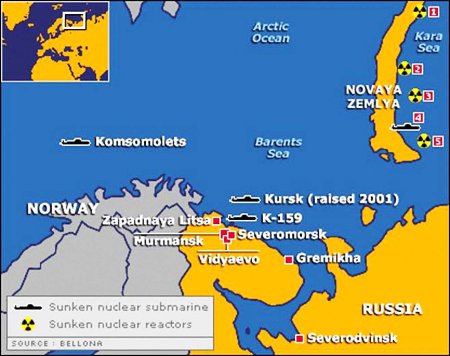
From 2001 to 2016, Russia lost 6.5 percent of its tree cover. The forests of the Russian Far East — known as the “Ussuri Taiga”— are being pushed to the brink of destruction due to pervasive, large-scale illegal logging. Most of Russia’s illegally sourced hardwood ends in Chinese sawmills, which produce goods for Western consumers. An estimated 25 percent of Russian timber exports are from illegal logging.
All at all, Russia has a dismal environmental record, but there are a few bright spots in the dark picture:
The joint Norwegian-Russian fishery management regime for the Barents Sea led to the recovery of fish populations, especially cod.
In September 2013 Putin issued a decree setting the national target for reducing emissions by 2020 to 25 percent less than 1990 levels.
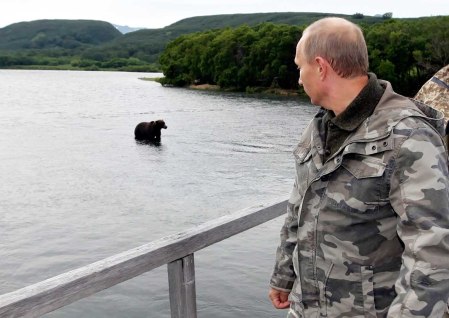
After decades of neglect and Soviet era large-scale collective farms (kolkhozy), who resembled the worst aspects of industrial agriculture, small organic farmers and gardeners in Russia were encouraged in the last decades.
The Private Garden Plot Act, which was signed into law in 2003, entitles every citizen to a private plot of land (dacha) free of charge, ranging in size from one to three hectares. The government doesn’t tax food produced by dachas. The result of this effort has been phenomenal, as the majority of Russian families grow practically all the food they need. Privately owned organic farms or backyard gardens provide about 40 percent of the countries’ food, including 92 percent of potatoes, 77 percent of vegetables, and 87 percent of fruit.
In 2004, the value of Russian gardeners’ output amounted to 51 percent of the total agricultural production.
Russia banned all beef, pork, fish, fruit, vegetables, and dairy products from the European Union, the USA, Canada, Australia, and Norway in retaliation to Western economic sanctions. This ban helps local farmers and further develops sustainable agriculture. Co-ops like LavkaLavka, who sell products from organic farms in small shops, have seen their fortunes sour and farmers markets are thriving.
Has Putin lost it? (religious revival, family values)
After the traumatic experience of the Soviet Union dissolution, which he views as a catastrophe, Putin is keen to emphasize Russian history, culture, and tradition.
Tradition includes of course religious tradition and the Russian Orthodox Church is seen as a guarantor of national cohesion and social stability. After Putin’s election victory Patriarch Kirill, head of the Russian Orthodox Church, blessed him in the 15th-century Annunciation Cathedral. The Annunciation Cathedral is considered a jewel of Russian architecture and one of the greatest medieval churches in the Russian capital.
Russia is a religious and, in fact, a Christian country, if one were to define a country by what its people believe.
A Pew Foundation survey from 2016 found that 74 percent of Russians identify themselves as Christians, compared to 37 percent in 1991. 57 percent, including around a quarter of the country’s Muslims and religiously unaffiliated citizens, have the opinion that being an Orthodox Christian means being “truly Russian.” The researchers found widespread public interest in protecting and supporting the Russian church, even when this harms non-Orthodox believers.
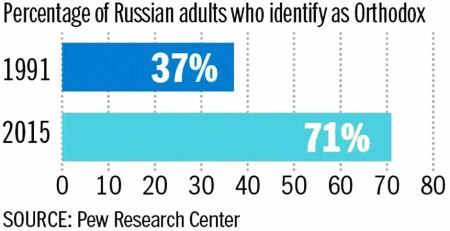
Additionally, many Orthodox Christians throughout central and Eastern Europe view Russia as a valuable counterbalance to Western influence in the region, Pew reported, which may weaken support for outside efforts to protect religious freedom.
Pew though found, that despite strongly identifying with Orthodox Christianity, a majority of Russians value religious and cultural diversity over a monoculture. 58 percent of adult citizens said, that it is better if society consists of people from different nationalities, religions, and cultures, compared to 34 percent who prefer a less diverse society.
Apart from surveys, Russia’s Christian renaissance is clearly visible and self evident. The Russian Orthodox Church has been expanding dramatically. It has 34,764 churches, 361 bishops, nearly 40,000 priests and deacons, 455 monasteries, and 471 convents.
Russia allegedly protects the Orthodox Church at the expense of minority religious communities. The Yarovay Bill from 2016 requires that religious (missionary) activity takes place only in registered churches, eliminating house churches and hindering missionary activity. Freedom to confess ones faith is still in place, but it has to be done peacefully, silently, in the corner, so as not to disturb others.
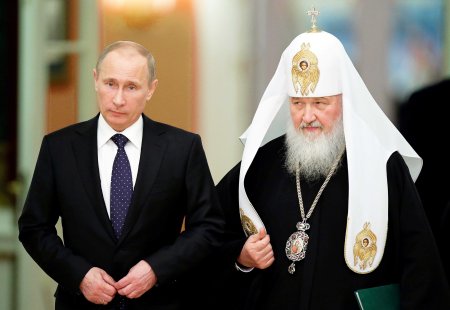
The Christian renaissance goes hand in hand with a revival of traditional family values.
Konstantin Malofeev, founder of the equity company Marshall Capital and the Orthodox Christian network Tsargrad TV, who bankrolls various social and charity organizations, describes himself as an “orthodox nationalist,” and states, that “Russia is the center of salvation for conservative, Christian, European values.”
In 2014 Malofeev sponsored a meeting of European and Russian nationalist politicians and academics in Vienna, Austria. The conference discussed ways to rid Europe of the “gay lobby,” and Russian philosopher Aleksandr Dugin was a keynote speaker. Aymeric Chauprade, member of the European Parliament from France’s FN (Front National), also attended the event. According to Chauprade: “Patriots around the world, as committed to the independence of nations as they are to the foundations of our civilization, turn their eyes at this time towards Moscow.”
Many on the European far-right see Russia’s anti-gay climate as a key part of their resistance to the EU and neoliberalism in Europe.
In 2013 the Russian Duma passed a LGBT propaganda law “for the Purpose of Protecting Children from Information Advocating for a Denial of Traditional Family Values.” The law was criticized by Western media as “anti-gay,” but supported by most of the Russian population.
For Russians, the Austrian bearded drag queen Conchita Wurst (Thomas Neuwirth), whose song won the 2014 Eurovision contest, confirmed what many already suspected: Europe is on a slippery slope toward cultural depravity. Even high-ranking Russian officials denounced the drag queen for embodying the loose morals that European integration entails.
In the renewed culture war between Western liberalism and Eastern traditional conservatism for which Conchita Wurst has become a symbol, Europe’s far-right parties have stood with the Russians. In its party program, Austria’s FPO defines family as “a partnership between a man and a woman with common children.”
The relationship between Russia and Western Europe’s far right may be a marriage of convenience, but it also shows signs of genuine affection. Closer ties with rising political parties in the EU will give Putin more leverage against NATO. For its part, the European right sees the Russian leader as a staunch defender of national sovereignty and conservative social values, who has challenged US influence and the idea of a Europe, controlled from Brussels, in a way that mirrors their own convictions.
For the Eurosceptic far right, endorsing the Crimean referendum was a carom shot that allowed them to reframe their defiance of the EU and the EU-Bureaucrats growing influence over national politics, but it was also an endorsement of Putin’s nationalism and social conservatism. French National Front (National Rally) leader Marine Le Pen derided the EU as an “anti-democratic monster” while in the same breath exalting Putin for doing “what is good for Russia and the Russians.”
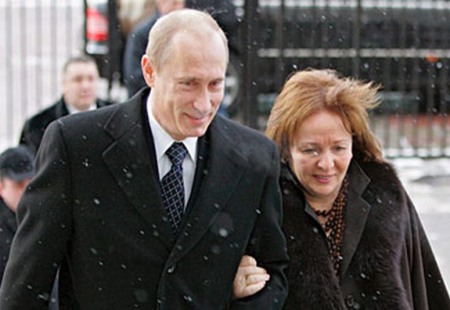
It is only fair to ask, if Vladimir Putin in his own private life exemplifies the traditional family values which he and his sympathizers hold in such high regard. He is apparently not homosexual but his family life seems not to be perfect, at least not according to common sense standards. In April 2013 the Kremlin confirmed that the divorce of President Putin from his wife of 30 years, Lyudmila, had been finalized.
Lyudmila Putin, who is known to dislike publicity, explained that flying was difficult for her and Putin was “completely drowned in work.” The divorce was “civilized” and the couple would “always remain close,” she added.
Alina Kabaeva was born in 1983, that same year that Vladimir Putin married Ludmilla. She is one of the most decorated gymnasts with two Olympic medals, 14 world championship medals, and 25 European championship medals. Alina Kabaeva is for sure an attractive woman, proven by the fact that she appeared on the cover of the Russian Vogue and in various other magazines. Since 2007 she is a State Duma deputy from the Party of United Russia. In 2008 a number of sources reported that she is the mistress of Putin and when she gave birth to her son Dmitri one year later it was assumed that Putin is the father. Considering Putin’s known fixation on physical fitness Alina is undoubtedly the perfect match for him.
Understanding Russia
Winston Churchill famously described the Soviet Union as “A riddle, wrapped in a mystery, inside an enigma,” and many commentators and politicians say Vladimir Putin’s Russia is every bit as mysterious and enigmatic as its predecessor.
Vladimir Putin himself is deemed a mystery. With his soft, sonorous voice and a calm, unpretentious manner, he doesn’t fit the public expectations of a world leader. Speeches and interviews are logical, informative, without bluster or grandstanding, though maybe sometimes they contain targeted misinformation (maskirovka).
And then this at first underrated man makes surprising forceful moves, catching all his opponents off guard. It’s no wonder that they hate him.
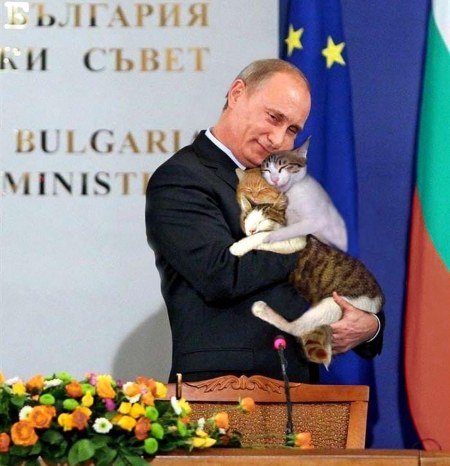
Russia never was under foreign rule during the past centuries, but the empire twice fell apart along ethno-linguistic lines: First after the Bolshevik revolution in October 1917 and then again in the thaw of reforms by the Soviet Union’s leader Mikhail Gorbachev around 1989.
Russian and Soviet nation-builders faced a much greater challenge because the various languages – from Finnish to German, from Russian to Turkic, from Korean to Romanian – were not only from entirely different linguistic families, but also written in different scripts, including Cyrillic, Latin, Arabic, and Mongolian.
National consciousness took shape in dozens of separate, linguistically defined moulds – rather than in an overarching identity comparable to that of the Han Chinese.
The Soviet nationalities policy after the revolution of 1917 cemented this state of affairs by teaching minorities how to read and write, and educating them, up to the 1950s, in their own language. Under tight supervision of Moscow, minority elites were allowed to rule the new, linguistically defined provinces and districts of the Soviet Union.
Non-Russian minorities were heavily underrepresented in the party leadership, the highest ranks of the bureaucracy, and the army, all of which were dominated by Russians. It is not surprising, then, that the leaders of the USSR were not able to forge an integrated “Soviet Nation” when, under Nikita Khrushchev some 40 years after the revolution, they tried to shift to a more assimilationist policy. Politically, the Soviet Union continued to resemble a patchwork of loosely connected ethnic entities. When the ice of totalitarian rule started to melt under Gorbachev, the country fractured along linguistic fault lines into the independent states of Latvia, Estonia, Lithuania, Georgia, Kazakhstan, and so on.
China’s population speaks many different tongues, which should make nation-building similarly difficult. However, letters, newspapers, and books are written in a uniform script (Hanzi), allowing individuals from different corners of the vast country to understand each other effortlessly.
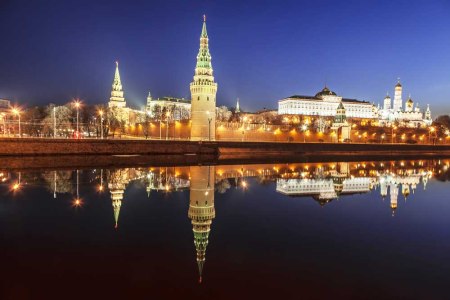
When the USSR fell apart, its core, with 75 percent of the territory and 51 percent of the population, became Russia.
In 2005, Putin said: “First and foremost it is worth acknowledging that the demise of the Soviet Union was the greatest geopolitical catastrophe of the century […] As for the Russian people, it became a genuine tragedy. Tens of millions of our fellow citizens and countrymen found themselves beyond the fringes of Russian territory.”
Much of Russian internal and external politics results from the traumatic experience of the collapse and the following dark years of the Yeltsin government. Putin will do anything to avoid a repeat of these events, he will boost social stability, try to create a national identity, emphasize, as already discussed, common heritage, culture, and tradition. He also will try to shield Russia from the lures of Western consumerism by pointing at signs of Western decadency.
Putin is not an autocratic ruler, his power is limited and he has to compromise and seek an accord of all involved parties. The only exception where this flexible approach is not appropriate is the fight against separatist movements (like in Chechnya) who threaten to further split-up the Russian Federation.
Putin is not an autocrat and Russia is not a dictatorship. For about a decade now, more than a dozen political parties regularly compete in Russian elections, with an average of between 12 and 15 candidates vying for a single seat. Popular gubernatorial elections, abolished by Putin in the aftermath of the 2004 terrorist attack in Beslan, were reinstated in 2012, the bar for party representation in Russia’s national parliament, the Duma, has been repeatedly been lowered, there exist about 70 nationally registered political parties.
Social and cultural life is rich, diverse, and without major tensions, the social contract is intact, more than ten million Russians (roughly 10 percent of the adult population) are involved in some form of organized volunteer activity, sustained by multiple funding sources.
Several of Russia’s largest daily newspapers, like Vedomosti, Kommersant, and Nezavisimaia Gazeta, are staunchly anti-Putin and reach tens of millions of readers. Novaya Gazeta’s web site alone garners more than 20 million views a month. Only three percent of roughly hundred thousand media outlets are state owned — Russia’s media biome is thus far more complex than is commonly assumed.
It was Vladimir Putin who introduced key elements of modern criminal justice to Russia. These include habeas corpus, a juvenile justice system, trial by jury, bailiffs, and judges of the peace.
The courts have struck down compensation limits for government negligence, strengthened the rights of defendants to exculpatory evidence, and provided clearer guidelines on secrecy. Closed judicial proceedings and pre-trial detention centers have been all but eliminated, privacy protections for individuals expanded, 24,000 free legal aid centers were established.
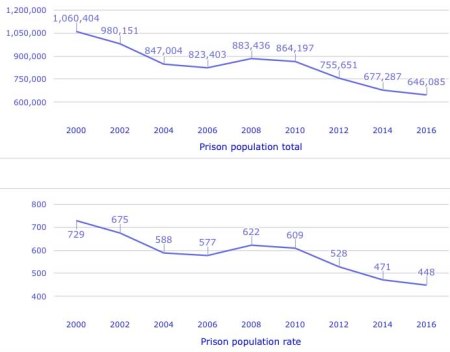
Since 2014, the number of suits brought on behalf of foreign companies has tripled, while judgments in their favor have risen from 59 to 83 percent. The number of persons incarcerated in Russia has fallen by almost 40 percent since 2001, and the number of minors in prison has fallen from 19,000 to just 1,000. There is no capital punishment, Russia has not executed anyone since 1996.
Pensions have risen tenfold since 2000 and the average life expectancy has increased by more than 6 years to 72.6.
Defending Russia, looking for friends
Putin is not a high stakes gambler and he is a good strategist. His approach is to just muddle through, maintaining the best relations achievable with as many countries as possible, the neighbors especially, talking to every side in every conflict and trying to defuse it, while carefully balancing the disparate interests of all involved.
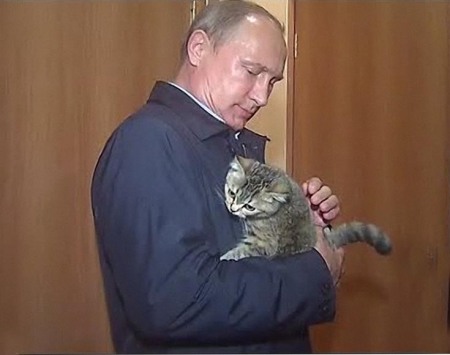
He appears to move in the direction of limited autarky; not closing Russia off to the world, but taking measured steps to become relatively invulnerable to vicissitudes. Russia is already self-sufficient in energy, nearly self-sufficient in food, and preparing to reach self-sufficiency in technology and finance.
The St Petersburg International Economic Forum, which traditionally promotes foreign investment in the Russian economy, ended this time as a major political event signaling a renewed bid for detente with the West. The Forum was a success both politically and economically, and at various signing ceremonies during the event the global business community concluded contracts valued at 30 billion Euros (this with a country that is under sanctions of the USA and the EU).
The Forum was attended by Chinese Vice President Wang Qishan, Japan’s Prime Minister Shinzo Abe, IMF chief Christine Lagarde, and French President Emmanuel Macron.
Macron fulfilled his obligation as human rights defender and had a 5 minute meeting with the director of the rights group Memorial and 13 minutes with the widow of Alexander Solzhenitsyn.
Regarding US President Trump’s decision to quit the Iran nuclear deal Putin articulated a highly nuanced position on the topic, criticizing the US’ rejection of the deal as a unilateralist move while also expressing understanding for Trump’s domestic compulsion in taking such a decision.
Putin proposed that the US and Iran, which had negotiated the 2015 pact directly, could resume their negotiations to settle the differences: “Even now, the US President is not closing the door on talks. He is saying that he is not happy about many of the terms of the deal. But in general, he is not ruling out an agreement with Iran. But it can only be a two-way street, and there is no need for unnecessary pressure if we want to preserve something. Doors must be left open for negotiation and for the final outcome. I think there are still grounds for hope.”
Putin probably sees Russia as a facilitator-cum-moderator between the US and Iran, but at any rate, he has deflected the focus from the EU’s approach, which single-mindedly focuses on the downstream impact of US sanctions against Iran. It is smart thinking on Putin’s part to signal that Moscow does not propose to wade into any transatlantic rift over the Iran issue. He probably doubts if the rift is real enough for outsiders to exploit.
The first International Forum for the Development of parliamentarism in Moscow, held on June 4 and 5, was a fairly big show, with about 500 delegates (400 of them MP’s) from nearly 100 countries. The forum revealed that Russia has few friends in the Western mainstream but is far from isolated, as it enjoys a good degree of sympathy in the rest of the world (Africa, Asia, South America), being able to articulate a vision which resonates with non-Western audiences.
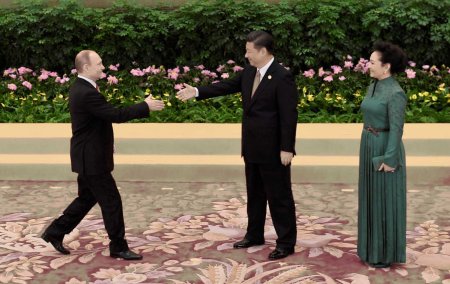
The Belt and Road Initiative, Chinese President Xi Jinping’s grandiose infrastructure and transport plan to improve Eurasian connectivity via a New Silk Road, coincides with Russia’s plan to become immune to US and European pressure.
At the moment, the bilateral trade between China and Russia stands at 86 billion US$. Estimates indicate that trade will reach 100 billion US$ next year and double in 2020.
The Power of Siberia pipeline is a natural gas pipeline in Eastern Siberia to transport gas from the Irkutsk and Yakutia fields to Russia’s Far East and China. The pipeline is 3,000 kilometers long and has been to 83 percent finished. Russia and China have signed a 30-year gas deal.
The two populist parties now ruling Italy hope for closer ties with Moscow and are both Eurosceptic. Prime Minister Giuseppe Conte told parliament in Rome that Italy was in favor of opening up towards Russia.
The Eurosceptic and anti-immigrant League party, in government together with the Five Star movement, has signed a cooperation agreement with Putin’s United Russia party. Leader Matteo Salvini has repeatedly spoken positively of Russia’s annexation of Crimea as well as its military campaign in Syria. Five Star founder Beppe Grillo supported the referendum in Crimea. According to Five Star and the League, Russia does not constitute a threat and remains a potential partner for NATO and the EU. Salvini wants to ally with Hungarian Prime Minister Viktor Orban — who is also sympathetic to the Kremlin — to change EU policy.
The Austrian government offered to host a meeting between Putin and Trump in Vienna, Putin has already agreed and asked the Austrians during a recent visit to organize a summit.
The right-wing FPOe (Freedom Party of Austria), junior partner in a coalition government, openly supports Russia. In 2016, party leader Heinz-Christian Strache signed a formal “cooperation pact” with Putin’s United Russia party. The parties agreed to “reinforce the links between our parties and countries, including in the field of international security.” The FPOe stresses, that building bridges to Russia is important to counterbalance the “overwhelming American influence.”
Austria depends on Russia for most of its natural gas, it was the first Western country to import Soviet gas 50 years ago. “American liquefied gas is two or three times more expensive than Russian gas. Under such circumstances, it makes little sense in purely economic terms to replace Russian gas with American LNG,” said Austrian President Alexander Van der Bellen, after signing a gas-supply contract with Moscow until 2040.
A third of Europe’s gas comes from Russia and that amount is growing.
On May 31 Turkish President Recep Tayyip Erdogan held talks with Putin’s envoy on Syria, the Kremlin official’s second visit to Ankara in a week as cooperation deepens. Lavrentiev visited Ankara already on May 24, when he had come directly from talks the day earlier in Damascus with Syrian President Bashar al-Assad. In Moscow, the foreign ministry said only, that there were discussions about “tasks aimed at advancing the political solution in Syria.” Erdogan and Putin also held the latest in a series of phone conversations on May 29.
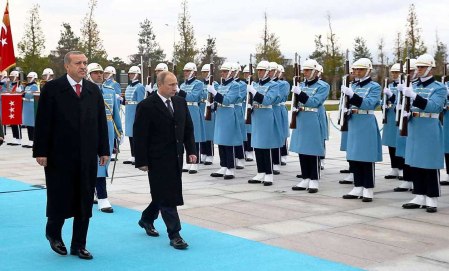
Turkey’s official policy remains to oppose Assad, whom Erdogan has repeatedly denounced as a “murderer”. But Ankara has softened its rhetoric against Damascus since the cooperation with Russia began, prioritizing the fight against the Kurdish YPG/YPJ militia in northern Syria, deemed by Turkey to be terrorists.
Russia would like to see a rapprochement between Erdogan and Assad in order to lay the foundation for a peaceful and stable postwar Syria. Prior to the civil war, Erdogan, then prime minister, and Assad enjoyed a relatively warm relationship frequently exchanging visits up to 2010. Their wives Emine and Asma also have cordial public ties.
As the Turkish Lira constantly loses value and both public and private debt balloon, economic issues may be as prominent in Erdogan’s mind as the Syrian conflict.
Gazprom and the Turkish government signed a protocol, on May 26, on building another section of the Turk Stream pipeline that will deliver Russian natural gas to Turkey and Europe. Moreover, the Russian gas giant and the Turkish pipeline company BOTAS agreed to establish a joint venture to complete the second onshore segment of the pipeline. The deal is another milestone in state-owned Gazprom’s quest to supply gas to the European Union by circumventing Ukraine.
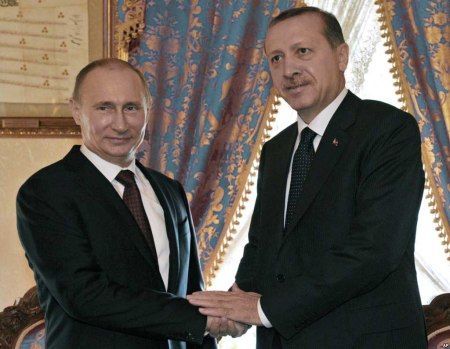
Gazprom has been clinching a deal with EU regulators on May 24 in an antitrust case that had dragged on for seven years. Gazprom succeeded in avoiding penalties but agreed to abide by a set of provisions and rules set by the European Commission.
On June 1, Russian President Vladimir Putin met in Moscow with Mohammed bin Zayed Al Nahyan, crown prince of Abu Dhabi and deputy commander of the UAE (United Arab Emirates) armed forces to sign a strategic partnership declaration. The UAE approaches toward Syria have changed and don’t align anymore with Saudi Arabia, there is no demand to remove President al-Assad, while both Turkey and Iran are urged to leave Syria.
Russia is returning to Africa, talking about anti-colonialism, offering university training in Russia, and dispatching private military contractors to provide security. It is gaining political allies as well as securing access to critical raw materials, including rare earth metals — one of the few natural resources Russia does not have a surplus of.
The nature and sweep of Moscow’s return was highlighted in March by Foreign Minister Sergei Lavrov’s visits to Angola, Namibia, Mozambique, Zimbabwe, and Ethiopia. In each of these countries, Lavrov pushed for three things: expanding security and political cooperation, opening their economies to Russian investment, and training specialists in Russian universities.
Moscow is spending only around 2 billion US$ to promote Russian-African trade, but it has written off 29 billion US$ Soviet-era debts, a move, noted and well received in all of Africa.
At the St. Petersburg International Economic Forum one session was dedicated to Libya’s reintegration into the world economic system. The panel brought together the foreign minister for the Libyan Government of National Accord, Mohamed Siala, Russian Deputy Foreign Minister Mikhail Bogdanov, and the head of the Russian contact group for intra-Libyan resolution, Lev Dengov.
Libyan military commander General Khalifa Haftar has Russian backing. He has asked Russia to build a military base in the country’s east and representatives of Libyan security services visited Moscow to meet with their Russian counterparts.
Russia’s government declared last year that it aims to have 710,000 foreign students from various countries enrolled in Russian universities by 2025, compared with 220,000 in 2017, and foreign students taking Russian online courses “should grow from 1.1 million to 3.5 million.” Moscow will invite Libyan students to Russia and, depending on the security situation, might open university branches in Libya. In addition Russia develops large-scale remote education programs to implement in both countries’ schools.
It is war!
The USA, with the EU acting as its obedient servant, has been imposing various kinds of sanctions on Russia starting with the Magnitsky Act in 2012, which was pushed through by British financier William Browder (Browder is the CEO and co-founder of Hermitage Capital Management, an investment fund that at one time was the largest foreign portfolio investor in Russia).
A Russian court has found Browder guilty of deliberate bankruptcy and tax evasion, sentencing him to nine years in prison in absentia. On May 30 Browder was briefly detained in Spain after a Russian Interpol request (Red Notice), but set free after Interpol Secretary General Jürgen Stock personally intervened.
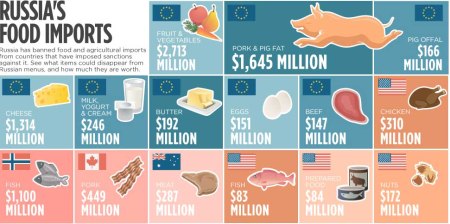
The sanctions, in place now since six years, have been sometimes damaging but often helpful, shielding Russian companies and stimulating import replacement by locally produced goods.
Russia has imposed a few counter-sanctions, for instance on various categories of food imports from the EU. This made it possible to ramp up food production within Russia, moving towards self-sufficiency in food. Since within the EU farmers are politically quite powerful, this made US sanctions unpopular in Europe.
Russian energy exports are another contentious issue, and the USA tries to sabotage the Nord Stream pipeline project to open the European market for US liquified natural gas. Contract negotiations and payment proceedings will be more difficult in future after a ruling of the Stockholm arbitration court on the dispute between Ukrainian Naftogaz and Russian Gazprom mandated the payment of 2.6 billion US$ by Gazprom and the resumption of gas supplies via Ukraine.
Russia may in future avoid Western based arbitration courts altogether.
The fact that the USA now wants to sanction or block Russian energy imports in Europe, thereby forcing the Europeans to buy from America or the Middle East, where supplies are much more expensive and far less reliable, has slightly strained US-EU relations and may drive a wedge between US and EU.
Or it may not, as blame for any upheaval will be put squarely on Russia.
Since Edward Bernays, undisputed pioneer of public relations and propaganda, US media are the world leader in deceptive storytelling and mass-indoctrination. Radio, TV, newspapers, Hollywood, the music industry, all work non-stop and perfectly synchronized to paint an extremely negative image of Russia.
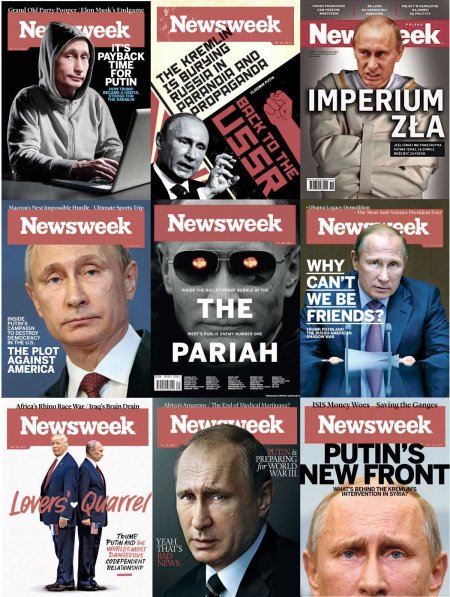
The already mentioned hedge fund manager Bill Browder published the book Red Notice: A True Story of High Finance, Murder, and One Man’s Fight for Justice, which became an instant bestseller. The book contains serious claims of corruption against Vladimir Putin and accusation that the lawyer Sergei Magnitsky was tortured and killed after he uncovered a massive tax fraud by Putin’s cronies. Browder was a client of Magnitsky.
Noted social critic Paul Berman observed, “Hostility to Russia is the oldest continuous foreign-policy tradition in the United States.”
Russophobia reigns in the US public mind, it is perhaps a by-product of US exceptionalism. For many US-Americans, the term “Russian democracy” is an oxymoron. While they tend to believe that most people are capable of democracy, in practice, generations of hostility — first toward the Russia Empire, then toward the Soviet Union — have firmly established Russia in the public mind as a nation incapable of democracy.
If one talks about “Russian elections,” one is likely to get a smile, because everybody agrees, that these elections are a sham.
A quarter century has passed since the fall of the Soviet Union and the official end of the Cold War, but little has changed. When President Putin invited the children of US diplomatic personnel in Moscow to celebrate Christmas at the Kremlin, after Russian diplomats and their families had been expelled from the US, the Guardian’s Luke Harding explained that this was a veiled threat on their lives, “for those who were able to decode it.”
Video recordings of Putin are checked frame by frame to get the least flattering picture for publication, his words are interpreted in the most unfavorable way, quoted out of context, falsely attributed, or deliberately mistranslated.
Media critic Stephen Boykewich called the media’s obsession with Vladimir Putin “a national addiction in the US, helping to create a perfect storm of anti-Russian sentiment in the Western media.”
Stephen Cohen, professor emeritus of Russian studies at both Princeton and New York University, has long challenged journalists to stop what he calls “the pointless demonization” of Putin. His colleague at Columbia University, Padma Desai, calls this “Putinphobia.” Their calls have been echoed by Henry Kissinger and Jack Matlock, as well as Tony Brenton and Roderic Braithwaite, two of Britain’s former ambassadors to Russia. Former British diplomat and intelligence analyst Alastair Crooke recently observed that “The compulsive hatred of President Putin in elite Western circles has surpassed anything witnessed during the Cold War.”
When Russians hoped in 2014, that the Winter Olympic Games in Sochi would improve their standing in the West both politically and culturally, the Ukrainian Maidan coup happened. The Ukraine is getting ready again to spoil the festive mood at the 2018 FIFA World Cup by attacking the breakaway Donetsk and Luhansk republics.
This time, the Russians will take it more lightly. Vladimir Putin was never much of a football fan — he much prefers ice hockey, as most of his compatriots. Surveys consistently show that Russians aren’t much interested in football: almost half of them don’t plan to watch the tournament at all.
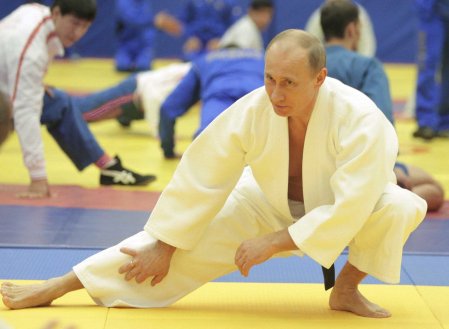
The British House of Commons Select Committee on Foreign Affairs issued a report entitled “Moscow’s Gold: Russian Corruption in the UK.” The fact that Russians have invested billions of pounds in the British economy is well known. The probability that some of this money comes from corrupt activities within the Russian Federation is also widely accepted.
Until now the oligarchs have been ideally suited go-betweens between Russia and the West and UK politicians had no qualms about staying on their yachts or serving of their boardrooms. Roman Abramovich, who epitomized “Londongrad” bling when he purchased Chelsea soccer membership and a home on a road referred to as “Billionaire’s Row,” in May struggled to get an extension of his UK visa. This prompted the Financial Times to publish an article with the headline: Londongrad oligarchs are being forced back to Russia’s embrace.
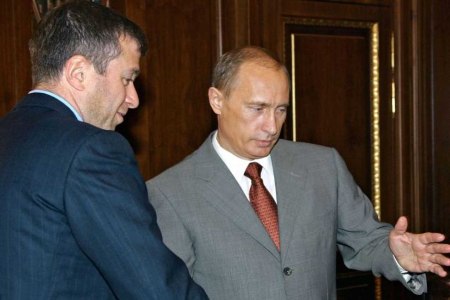
The storytelling in the last time got a bit sloppy, one could say even ridiculous:
In the UK former spy Sergei Skripal and his daughter Yulia were “attacked by a military grade nerve agent” that purportedly kills in seconds – and they are alive and healthy.
Arkady Babchenko, a Russian journalist who was reportedly killed in Kiev on May 29 and widely mourned, stood up alive and unharmed at the office of Ukraine’s State Security Service on May 30, claiming his death was faked in a special operation to capture the prospective assassin.
Both incidents generated a lot criticism of Russia, and President Putin was personally blamed. No one died, yet the amount of media attention generated surpassed easily the at the same time happening murder of 60 unarmed Palestinians and the wounding of thousands by Israeli snipers during demonstrations at the Gaza border.
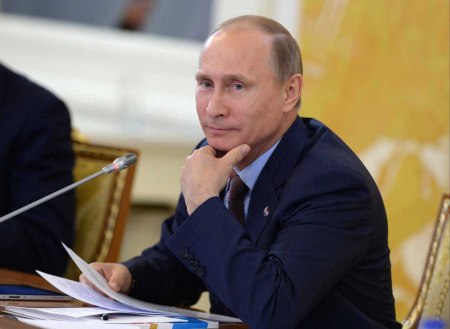
A textbook color revolution took place in Yerevan, Armenia, exactly as it has been tried and tested before in Belgrade (2000), Tbilisi (2003), and Kiev (2004, 2014).
Armenia is a small country, but it is a formal ally of the Russian Federation, a member of the Moscow-led Collective Security Treaty Organization (CSTO) and the Eurasian Economic Union (EAEC)—two pillars of President Vladimir Putin’s presumed geopolitical strategy. Armenia also hosts a major Russian military base in Gyumri, leased until 2044.
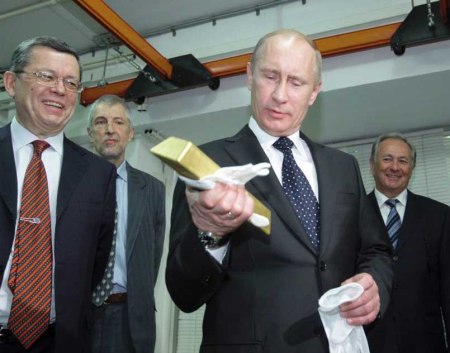
Western powers have to act fast, because soon the entire Eurasian land mass will be organized as a super-trading bloc via Chinas BRI (Belt and Road Initiative), the EAEU (Eurasia Economic Union), the SCO (Shanghai Cooperation Organization), and the AIIB (Asia Infrastructure Investment Bank). If this economic project can be pulled off, and the petrodollar be replaced by the Yuan, half of the world will have irreversibly slipped away from Washington’s influence.
Sources in Russian military and intelligence agencies warn that preparations of a full-scale terror offensive against Russia via Central Asia are in its final phase. Remnants of the now defunct IS (Islamic State) in Syria and Iraq travel by sea to the port of Karachi in Southern Pakistan and continue to Peshawar near the Afghan border to finally settle in the eastern Afghan Nangarhar province. There they prepare to infiltrate the republics of Turkmenistan, Uzbekistan, and Tajikistan. The new HQ of IS in the region is situated in the Achin district of Nangarhar.
Starting from late 2017, terrorists managed to bring in some 500 militants from Syria and Iraq including dozens of women. Most of them are said to be citizens of France, Sudan, Kazakhstan, the Czech Republic, and Uzbekistan.
The main objective of IS in Afghanistan is not destabilizing the country, but a full-scale invasion of post-soviet Central Asian Republics (Turkmenistan, Uzbekistan, and Tajikistan) – in order to create instability in southern Russia.
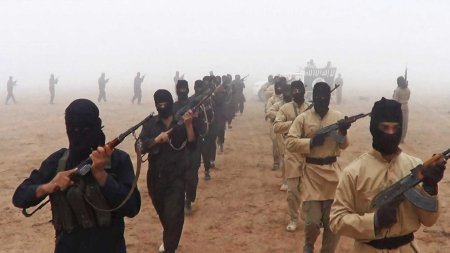
Mohammad Gulab Mangal, governor of Nangarhar province and earlier governor of Helmand province, is accused of aiding IS in getting a foothold on his territory. Mangal is well-known for taking part in IS’ financial operations and also said to be connected to US special forces.
Tajik Foreign Minister Sirodzhiddin Aslov reported of terrorist movements in the region:
“We see the activation of terrorist groups, their advancement to the northern regions of Afghanistan, especially in the territories bordering with Tajikistan, the increase in the number of IS supporters, and the participation of a certain number of citizens of the post-Soviet republics in the terrorist groups and movements present in Afghanistan … this is of utmost concern to us.”
According to Russian intelligence agencies, the number of IS terrorists operating in Afghanistan ranges from 2,500 to 4,000 trained individuals. This information has been confirmed by the Chinese Ministry of Defense.
Further reading:
https://mato48.com/2014/09/14/strange-bedfellows/
https://mato48.com/2014/11/23/shattered-dreams-of-victory-and-prosperity/
https://mato48.com/2015/01/27/putins-ultimatum-to-the-oligarchs/
https://mato48.com/2015/09/30/judo-in-geopolitics/
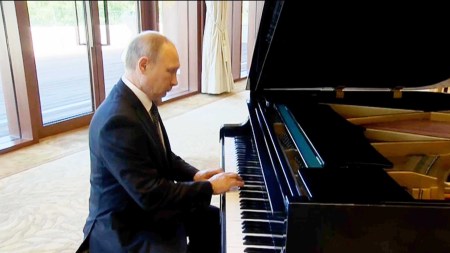
Russian President Vladimir Vladimirowich Putin has certainly made his mark and he will be remembered not only as the most important Russian politician since Khrushchev, but also as the most adept and competent world leader of the early 21th century. Even as he is demonized in Western media, nobody doubts his dominance, authority, and effectiveness.
For example: Russia’s engagement in Syria until now has been successful. Russian air support helped Syria to defeat the Islamic insurgents (Aleppo, Deir ez-Zor, Eastern Ghouta) and recapture much of the countries territory.
Using Syria as a live experimental battlefield, Moscow was able to show its military capabilities and gain invaluable lessons from the results of newly developed weapons. Damascus agreed to sign a 49 year contract about the naval base in Tartus and the military mission will boost Russia’s economic role in Syria relating to the exploitation of energy resources and the reconstruction of the country.
The main motive to join the Syrian war though may have been, that Putin decided to pursue his Chechen jihadi enemies all the way to Syria and to defeat them there. Reports of Russian military intelligence first go directly to the Kremlin. Putin reads them; he is a micro-manager. There will be no Brezhnev-style Afghanistan disaster in Syria, no unauthorized retreats, no Kremlin lethargy. Russian officers speak good Arabic and, like in the Syrian army, the officers go to the front lines and lead their troops from there.

Putin tries to keep the costs low and avoid risks. Despite taking sides and saving Syrian President Dr. Bashar al-Assad, he remains on relatively good terms with Israel, Iran, Turkey, Egypt, Lebanon, Saudi Arabia, the UAE, and other Arab monarchies.
In the political arena, Russia plays a vital role in the Astana talks with Turkey, Iran, and Syria, which impose themselves as a real and efficient alternative to Geneva.
The Middle East is in turmoil and things can change fast. Saudi Arabia will have to bail out Jordan with a 2.5 billion US$ five-year aid program after massive protests against austerity brought down the Jordanian government and threatened a collapse of the Hashemite kingdom. In Iraq Muqtada al-Sadr forms a coalition with the pro-Iranian Fatah Alliance, opposed by the West. A genocidal war in Yemen rages on, and Qatar is still embargoed, supported by Turkey and Iran, who reap political benefits.
The Syrian war is winding down, fewer civilians died in May than in any other month since the outbreak of hostilities in 2011, though with 244 civilians killed across the country it is still a tragedy that should end as soon as possible.
During his annual televised call-in show Putin said, that Russian troops “will stay there for as long as it is to Russia’s advantage, and to fulfill our international responsibilities,” adding: “we are not building long-term installations and if necessary can withdraw our servicemen quite quickly without any material losses.”

Putin tries to end the war, his Western adversaries apparently try to keep it going.
In April 2017 the United States and its allies launched 59 “disciplinary” cruise missiles against Syria’s Shayrat Airbase in response to an alleged nerve gas attack in Khan Sheikhoun. This April the Western powers sent 104 more cruise missiles to the Barzah research center and several airbases in response to an alleged nerve gas attack in Douma.
Syrian air defenses have intercepted a number of these missiles but there are contradicting claims or estimates how many. Russian air defense systems didn’t get involved, though there are reports that jamming by Russian electronic warfare systems caused some cruise missiles to fail.
Numerous air-defense systems safeguard Russia’s Hmeimim base near Latakia plus its naval logistics facility in Tartus and offer protection for the jets during air operations against Islamists.
Deployed are Pantsir-S1 (short range), Tor-M2 and Buk-M2 (medium range), S-400 (long range), and Krasukha-4, Khibiniy-U, Richag-AV electronic warfare systems (jamming, disabling electronics of enemy UAVs using nanosecond electromagnetic pulses, ground electromagnetic pulse generators).
It sounds impressive, but defense experts have repeatedly questioned the capabilities of these systems due to their lack of engagement during multiple air strikes on Syrian regime targets conducted by Israel, the US, and their allies.
Israel bombs Syria
The IAF (Israeli Air Force) has intermittently attacked Iranian weapons shipments in Syria in the past, stressing it will not allow Iran to arm militias and Lebanon’s Hezbollah.
On April 9 Israel escalated and targeted Syria’s T-4 airbase, killing 14 soldiers, 7 of them Iranians. On April 29 the IDF did hit again, targeting mainly air defense installations (Pantsir-S1 and S-200). Until now Israel has conducted more than 100 airstrikes in Syria and has suffered only one known loss: an F-16 was brought down in February by the Syrian army in what Israel claimed was a crew error.

Cold blooded and deliberately, the government in Jerusalem thus ended its “deconfliction” arrangement with Russia which was negotiated between Putin and Israel’s Prime Minister Benjamin Netanyahu in September 2015. The agreement gave Israel a free hand against weapons transfers from Iran to Hezbollah and allowed continued Israeli deterrence on its northern border.
The Israeli aggression nevertheless will not end the cordial relation between Putin and Netanyahu, and history explains why this is so.
When after the 1967 Six Days War the Russians did commit themselves wholeheartedly to one side in the Arab-Israeli conflict — backing the Arabs diplomatically, arming them, sending a strong military force to defend Egypt in 1970 from Israeli air attacks, and breaking off diplomatic relations with Israel — the result for Moscow was a catastrophe.
The USSR’s large Jewish community became alienated, the USSR found that by making an enemy of Israel it had further poisoned its relations with Western powers at precisely the time when it was seeking detente, and the USSR quickly discovered that its Arab allies in whom it had invested so much were both ungrateful and treacherous, so that by 1980 the USSR’s position in the Middle East completely collapsed.
The final straw came after the Soviet intervention in Afghanistan in 1979, when volunteers from across the Arab world rushed to fight the Russians in Afghanistan, with a dedication that they had never shown in the struggle against Israel on behalf of the Palestinians.
Not surprisingly, the Russians have therefore since the mid-1980s been determined never to become directly involved in any part of the Arab-Israel conflict again. Anyway, after Saudi Arabia became an Israeli ally in all but name, the Palestinians are practically on their own and Arab nationalism is at a dead end.
Russia has not intervened against Israeli attacks and has refused to give Syria S-300 anti-aircraft systems, thought it has brought in dozens of new Pantsir-S1.
Israel justifies the attacks with the need to curb Iranian influence in Syria. Iran is depicted as an existential threat to Israel and it supports Hezbollah, which deters Israel from seizing the water-rich Litani basin in southern Lebanon.
Israeli energy minister Yuval Steinitz warned, that Israel will assassinate Syrian President Bashar al-Assad if he continues to allow close ally Iran to operate in Syria. This is not an empty threat, Mossad has assassinated at least four Iranian nuclear scientists and carried out more than 2,700 other assassinations (details in: Rise and Kill First by Rosen Bergman).
The frequent contact between the Russians and Israelis in the last weeks triggered rumors of a “secret Russian-Israeli deal” to push pro-Iranian militias from southern Syria.
President Putin was speaking about a withdrawal of all foreign troops during his Sochi Summit with President Assad, and Russia’s Special Envoy to Syria Alexander Lavrentiev shortly thereafter elaborated on his boss’ suggestion by confirming that “this includes the Americans, Turks, Hezbollah, and of course, the Iranians.”
Russian Ambassador Vasily Nebenzya announced, that an agreement between Russia and Israel about the withdrawal of Iranian military advisers and Hezbollah fighters from the southern regions of Daraa and Quneitra near the Golan Heights has been reached. The pullout of Hezbollah is already happening and has been confirmed by local sources.
Things don’t always go smoothly. When Russian troops deployed near the town of Qusair at the Lebanese border to replace Hezbollah, the Hezbollah commanders objected and the standoff could only be resolved, when Syrian Soldiers from Division 11 moved into the disputed positions. Leader Hassan Nasrallah said publicly that Hezbollah will remain in Syria as long as Bashar al-Assad needs it there.
Russia, as a self-appointed but seemingly mutually accepted middleman between Israel and Iran, is engaging in talks with both sides, seeking the least painful option for both. Russians are not negotiating behind Assad’s back, both Hezbollah and the Iranians continue to be informed and consulted. Iran officials themselves publicly indicated they wanted a deal in Syria with Israel and were seeking Russian help and mediation.
Sheikh Sadiq al-Nabulsi, a Lebanese-born religious scholar, who is close to Hezbollah, outlined in an interview with the daily Kommersant a possible Moscow-guaranteed deal: Hezbollah and other pro-Iranian forces would move away from the IDF positions in the Golan Heights, while Syrian and Russian forces would move into rebel-held parts of Daraa and Quneitra provinces. At present, this portion of Syria is within a so-called “de-escalation” or “safe” zone, guaranteed by Russia, Jordan, and the USA.
Israel also wants a guarantee, that Iran will not deploy anywhere in Syria long-range weapons (missiles) that may possibly threaten Israel.
Whatever may happen, the military and economic help from Iran during the war has created personal ties and sympathies which cannot be erased by a deal between Putin and Netanyahu, in other words: Iran will remain an important player in Syria even if Iranian troops leave.
President Assad has called on Iran to participate in the countries reconstruction, Iran was granted a license to become Syria’s third mobile communications provider, Iran and Syria will convene a joint committee to sign a document for strategic, long-term cooperation.
Special Russia Israel relations
Russian interests are not completely aligned with those of Syria, there are major and maybe even irreconcilable differences regarding relations with Israel, Turkey, the Kurds, Iran, and about Russian investment in Syrian oil exploration.
While Putin accepts the praise of Bashar al-Assad for saving Syria from the jihadis, he calls Israel’s openly racist defense minister Avigdor Lieberman “brilliant.”
Lieberman, who btw is a former nightclub bouncer from the ex-Soviet Union, and other top Israeli officials met on May 31 with Russian Defense Minister Sergei Shoigu. The primary focus of the visit was the situation in Syria and specifically, in Lieberman’s words, “the entrenchment of Iran and its proxies” there.
At the St. Petersburg International Economic forum on May 24/25 Putin said two completely unexpected things: first, that Iran should remove its forces from Syria and second, that Israel has a right to defend its borders.

One has to consider, that Israel has a powerful pro-Israel lobby inside Russia. There is a sizeable minority of patriotic Russian Jews and they are an integral part of Russian culture and history. Likewise there is a substantial Jewish diaspora in Israel which still feels connected to their former homeland.
Israel just recognized Victory Day (May 9) as its own national holiday. A third of Israelis are in fact of Russian origin, and a lot of them felt very proud to be Russian that day, taking part in big parades that were broadcast on Russian television. In the face of a rising wave of antisemitism in Europe and with neo-Nazis running amok in the Ukraine, Russia and Israel stand united. A US Jewish publication rang the alarm bell: “Violent Anti-Semitism Is Gripping Ukraine — And The Government Is Standing Idly By.”
Then there is the Word War II factor, which Israelis and Russian Jews have been extremely skilled at exploiting to the max: Russians and Jews are united in a common memory of the horrors the Nazis inflicted upon them and they also often sense that West Europeans and US-Americans are maybe not quite as sincerely sympathetic to their plight even if political correctness forces them to pretend to be.
As a result, you will find that most anti-Zionist Russians, while surely not “ADL (Anti-Defamation League) compatible” in their views, hate the Nazis and everything Western racism stands for no less than Jews would. If fact, when faced with the modern wave of rabid Russophobia, many Russians say “we are the new Jews”, meaning that everything evil on the planet is blamed on them regardless of fact or logic. Like it or not, but common memory and sentiment does bind Russians and Jews in a profound way.
When Russian billionaire and Chelsea football club owner Roman Abramovich, who, like many of his fellow oligarchs, is Jewish, faced unusually long delays in renewing his UK visa, he flew to Tel Aviv and received documents confirming his status as an Israeli citizen. He has reportedly bought a former hotel in Tel Aviv.
Israel grants citizenship to any Jewish person wishing to move there and a passport can be issued immediately. Israeli passport holders can enter the UK without a visa for short stays, although they require visas to work.

Though the soft stance against Israel can be easily explained, it risks encouraging Washington and the NATO allies to start a decisive escalation, because “Putin has blinked” and “Russia has shown itself to be a paper tiger.” The price of the current appeasement could be a radically reduced maneuvering space and an exponentially increased danger of a lethal escalation.
Eventually Russia may be forced to respond to the ever-escalating provocations. Putin, a judo black belt, will certainly use the weight and strength of Russia’s opponents to throw them off balance rather than opposing them in a direct confrontation.
Will that be enough to avoid a deadly showdown?
Nothing new in Russia
This is Putins fourth and most likely also last term in office.
After his resounding victory in the presidential election with 77 percent of the votes Putin surely had a mandate to get rid of the Western friendly liberals (called by some pundits “Atlantic Integrationists” ) like Alexei Kudrin and Dmitry Medvedev. But he reappointed Medvedev, Kudrin became Chairman of the Accounts Chamber of Russia, Konstantin Chuichenko became the government’s chief of staff plus deputy prime minister, and Vitalii Mutko became Deputy Prime Minister in charge of construction.
Chuichenko is a confidant of Medvedev, Mutko is blamed for the gross mismanagement of the “Russia doping scandal” controversy and is absolutely despised for his incompetence.
The big expectation that, with a strong personal mandate from the people, Putin finally would kick the liberals out of the Kremlin has been unfulfilled. Putin actually appears more concerned about maintaining a balance between multiple vying clans in his court.
Yet, one has to admit, that the Medvedev government has done a decent job in regard to the economy. There would have been better economic policies available, but nobody can argue that the government completely failed.
Also important: Putin values loyalty, and Medvedev undoubtedly has been loyal, and that over many years and in constantly changing scenarios.
Lavrov and Shoigu are both staying, Sergei Glazyev is still economic advisor. Glazyev’s program of ending Russia’s dependence on foreign markets and the dollar by returning to partial convertibility of the ruble, prohibiting free capital transfers abroad to stop flight, and achieving a mobilization breakthrough at home will maybe getting a chance if Western sanctions continue.
In his annual televised question and answer session on June 7 many people asked why Putin didn’t clean house after his reelection and instead reappointed mostly the same people to same or different ministerial positions within the government, prime minister Medvedev in particular. Putin’s explanation was that these were the people who had spent the previous year or more planning the breakthrough, the great Russian leap forward, that is scheduled to occur over the next six years — Putin’s “six-year plan” — and that two years would be lost if they were replaced with new people who haven’t been part of the process all along. The task before them is known; they have accepted the challenge. “Personification of responsibility” is a phrase Putin repeated three times. “Personal responsibility must be absolute,” he added.
Has Putin lost it? (The economy)
Putin is a pragmatist and not an ideologist; he is not per se against globalization, capitalism, and consumerism.
It seems that Putin does not break with the West, because he believes that Russian economic development is dependent on Russia’s integration with the industrialized countries. This is what neoliberal economics tells the Russian economic and financial establishment.

Vladimir Putin’s speech at the already mentioned St. Petersburg International Economic Forum documented again his ensnarement by neoliberal economic policy. Putin defended globalism and free trade, stressing that the door remains open for integration into the Western economic system.
Consequently, Putin continues to accept provocations and humiliations in order to avoid a decisive break that would cut Russia off from the West. In Washington and the UK this is interpreted as a lack of resolve on Putin’s part and it encourages an escalation in provocations that will intensify to ultimately force Russia’s surrender.
Neoliberal economics expose Russia’s currency to speculation and manipulation. Capital inflows can be used to drive up the value of the ruble, and then at the opportune time, the capital can be pulled out, dropping the ruble’s value and driving up domestic inflation with higher import prices, delivering a hit to Russian living standards. Washington has always used these kind of manipulations to destabilize governments.
Neoliberal economic theories have also created the belief that Russian economic development depends on foreign investment. This erroneous belief threatens the very sovereignty of Russia. The Russian central bank could easily finance all internal economic development by creating money, but central bank head Elvira Nabiullina thinks that if the bank finances internal development the result would be inflation and depreciation of the ruble. The central bank is borrowing abroad money it does not need in order to burden Russia with foreign debt which requires interest payments to Western firms.
If Russia borrows dollars, it cannot spend them domestically to finance development projects, so the dollars go into Russia’s foreign exchange holdings and accrue interest for the lender. The central bank then creates the ruble equivalent of the borrowed and idle dollars and finances the project. The USA in turn can use the dollar debt to exercise pressure and influence Russian economic decisions.

There are signs that Putin is hedging his bets. Russian oil deliveries to the EU have dropped 40 percent while exports of Russian oil to China have risen about 30 percent. India has received its first ever tanker shipment of liquified natural gas from Russia and there are plans to boost Indian LNG imports to 70 million tons annually.
Russian gold reserves have reached 1,910 tons. Since 2009, Russia has added over 1,100 tons of gold to its reserves — more than China which added about 775 tons during the same time. Russia has been buying up more of their gold mining production, in effect converting rubles into gold. Russian gold mining companies are planning to double production; such an increase would make Russia the world’s second largest producer of the precious metal.

The Russian Central Bank announced that it would start buying gold on the Moscow Stock Exchange. Russia has the fifth largest gold reserves of any nation, this will be a useful asset if the petrodollar hegemony comes to an end.
Since six years Moscow has been constantly selling US Treasuries.

Has Putin lost it? (The oligarchs)
Putin’s power base are the Russian people, not the oligarchs, as Western pundits allege, and yet there is no decisive move against the oligarchs.
In the 1990s it was obvious that the actual power in Russia lay not with Boris Yeltsin but with the oligarchs backing him. The late Boris Berezovsky preferred to provide the impression he ran the nation during Yeltsin’s frequent absences resulting from coronary heart issues or alcoholism and that he had handpicked Vladimir Putin as the subsequent chief.

Putin shifted the power dynamic in his first years in office. Berezovsky and Vladimir Gusinsky, who challenged him through their TV channels, were forced to flee. Mikhail Khodorkovsky, who dared to take on Putin politically, was jailed for a decade.
That turned most of the other oligarchs into supplicants working under an unwritten rule: They are allowed to maintain their wealth in exchange for staying out of politics and supporting Russia’s economic development.

Putin has the means to crush the oligarchs but he will not do it because some of them are his longtime friends, like the Rotenberg brothers, Sergei Ivanov, and Gennadi Timchenko. Their companies prosper because of lucrative government contracts (the Kerch bridge to Crimea for instance was built by Arkady Rotenberg’s Stroygazmontazh). Roman Abramovich, winner of the Aluminium wars and owner of the worlds second largest superyacht, is seen as personal banker to the Kremlin. His personal ties to Putin are said to be excellent.
It is surely not too harsh to label this as cronyism, even if Putin doesn’t enrich himself.
Has Putin lost it? (Western hostility)
Since the 2014 Maidan putsch, which overthrew the Ukrainian government, there is a constant drumbeat of Ukrainian provocations against Russia, and Russia has been saddled with economic and political sanctions by the USA and the EU, supposedly in response to the annexation of Crimea and the unsettled conflict in the Donbass region.
Yet Russia remains Ukraine’s largest trading partner. Not only does Russia continue to trade with the Ukraine, but it has also absorbed an exodus of economic refugees from the collapsed Ukrainian economy which numbers in the millions. Russia has resettled these refugees, allowed them to find work, and is allowing them to send money back to their relatives in the Ukraine. Also, Russia has declined to give political recognition to the two separatist republics in eastern Ukraine.
Russia retaliated against Western sanctions with counter-sanctions on food and raw materials, but has continued to trade with all of the countries involved. In particular, it has continued to supply the Baltic states with electricity.
Russia could for instance block the sale of titanium parts without which Boeing wouldn’t be able to build its planes or could prohibit the sale of rocket engines to the US, which are needed to launch satellites.
Despite all bellicosity and humiliation, Putin keeps the door open. He probably hopes that in the long run the continuous US aggression will alienate Washington’s European allies, who bear the brunt of the economic warfare. Trump’s trade wars could be very helpful in this respect (the EU just announced that it would cease trade negotiations with the US and slap retaliatory tariffs on 3.3-billion US$ worth of US products).
If Putin’s bet doesn’t pay off, the effect of Russia’s restraint will be though, as stated before, a steady escalation with the goal to bully Russia into submission.
Has Putin lost it? (The environment)
Putin is not an environmentalist, he believes in climate change, but doesn’t think it is man made. He also believes in continuous economic growth, and he has no qualms to promote nuclear energy all over the wold.
Russia’s huge landmass and enormous wealth in natural resources make it one of the main purveyors of economically essential products to the world, especially oil, gas, coal, and uranium.
Russia provides Western Europe with natural gas and intends to become a major provider of fossil fuels to China. Russia has developed an exploration method, using ammonium nitrate, as alternative to fracking (hydraulic fracturing). Oil exploration in the Arctic is increasing, both on land (Yamal-Nenets field) and offshore at the world’s first stationary Arctic platform (Prirazlomnoye field).
Despite environmentalists arguing for a carbon tax, the Russian energy and finance ministries agreed with oil companies to start cutting the export duty on crude gradually, to bring it from the current 30 percent to zero over the next six years.
While various Russian regions witnessed the results of climate change over a period of several years and were hit by resulting catastrophes (Central Russian forest fires in 2010, floods in the Far East in 2013 and in the Altai in 2014), measures to reduce fossil fuel consumption enjoy little public support. For Russians, the issue is too abstract, too global, and its manifestations are not visible to all. Interest and a willingness to address environmental problems that are both near at hand and more obvious (air / water / soil contamination, car traffic, polluting plants and factories) have increased in recent years, but climate change is of little interest to Russians.
The dangers of nuclear energy are not a matter of public discussion either. There are 35 operating reactors with a combined capacity of 26,983 MW. Originally licensed for 30 years, most have been upgraded to extend the lifetime by another 15 years.

In Saint-Petersburg on April 28 Russia launched the world’s first floating nuclear power plant Akademik Lomonosov with two reactors capable of producing 70 MW. It will be towed for fueling in Murmansk, and then go on to provide power to the Arctic town of Bilibino in the Russian Far East, where the local nuclear plant is due for decommissioning in 2019.
Greenpeace calls it a “Chernobyl on ice,” and environmentalists are deeply worried about an eventual large scale radioactive contamination of the worlds oceans which would dwarf the Fukushima disaster and endanger health and life of everybody.

On many of Putin’s foreign state visits he acts as a salesman for Rosatom, Russia’s state nuclear corporation. Exports of nuclear goods and services are a major Russian policy and economic objective. Over 20 nuclear power reactors are confirmed or planned for export construction. Foreign orders totaled 133 billion US$ at the end of 2016.
Russia and Argentina have signed a memorandum of understanding on uranium exploration and mining. Rosatom is offering to supply Argentina with a nuclear power plant.
Rosatom will expand the Paks nuclear power plant in Hungary with two VVER-1200 reactors. Construction initially should have started this year, but has been rescheduled to begin in 2020.
In Ostrovets, Belaruse, two VVER-1200 reactors are built by Atomstroyexport. The first is expected to be operational next year, the second in 2020.
Construction of the Bushehr 2 nuclear power plant in Iran has started. The plant will have two VVER-1000 power units with a combined capacity of 2100 MW. Nuclear fuel for the reactors will be provided by Russia during the whole life cycle of the reactors and spent fuel will be returned to Russia for processing and storage.
In April Russia started building Turkey’s first nuclear power plant at Akkuyu. Four reactors with 1114 MW are planned.
Russia, India, and Bangladesh have signed a tripartite agreement for civil nuclear cooperation. India’s Kudankulam Plant was built with Russian assistance. The Rooppur plant in Bangladesh will have two units based on Russia’s VVER-1200 reactors. VVER-1200 technology is also likely to be offered to India for the second set of six Russian built nuclear reactors.
But what about the nuclear waste?
34 large and 257 small disposal sites for radioactive waste are available. However, the controls at these sites are often inadequate and illegal dumps of radioactive waste abound. There are 26,000 containers of nuclear waste in northern Russian locations waiting to be reprocessed, along with thousands of containers with permanently discarded nuclear waste, old reactors, and decommissioned nuclear submarines dumped in the ocean. Many storage facilities have been in use long past their intended lifespans, and leaks of radioactive material into the surrounding soil are well-documented.
In 2016 Rosatom opened its first ever permanent repository for low and medium level nuclear waste at Novouralsk. A site for high level nuclear waste is currently being planned at the Nizhnekansky Rock Mass in the Krasnoyarsk Region.
Soviet era nuclear waste poses a threat to Arctic and Pacific Ocean. Many areas of the Barents Sea, the Kola Sea, the Kara Sea, and the Sea of Japan are heavily contaminated.
There are 17,000 containers with nuclear waste at the bottom of the Kara Sea and some of the containers show already signs of leakage. And yet, the threat posed by these small objects pales in comparison with the spent reactor fuel housed in the rusting carcasses of Soviet-era nuclear submarines and a number of individual reactor compartments torn from their original vessels and dropped into the ocean.
The most dangerous hazards are the nuclear submarines K-27 (Kara Sea), K-278 Komsomolets, and K-159 (Barents Sea). The KK-278 has two plutonium warheads on board. There were also 16 reactors from various vessels dumped into the Arctic seas. The Kursk submarine, which sank after a huge torpedo explosion in 2000, was lifted and brought to land for decommissioning two years after.
In addition to waste produced at home, Rosatom has agreed to reprocess and store nuclear waste produced by plants the company has constructed abroad. Rosatom has agreements with Egypt, Turkey, Belarus, Hungary, Finland, and several other countries to manage nuclear waste repatriation. Russia reprocesses nuclear waste to extract usable plutonium and uranium so it can be reused as fuel. These complicated processes create additional risks of radioactive contamination.

From 2001 to 2016, Russia lost 6.5 percent of its tree cover. The forests of the Russian Far East — known as the “Ussuri Taiga”— are being pushed to the brink of destruction due to pervasive, large-scale illegal logging. Most of Russia’s illegally sourced hardwood ends in Chinese sawmills, which produce goods for Western consumers. An estimated 25 percent of Russian timber exports are from illegal logging.
All at all, Russia has a dismal environmental record, but there are a few bright spots in the dark picture:
The joint Norwegian-Russian fishery management regime for the Barents Sea led to the recovery of fish populations, especially cod.
In September 2013 Putin issued a decree setting the national target for reducing emissions by 2020 to 25 percent less than 1990 levels.

After decades of neglect and Soviet era large-scale collective farms (kolkhozy), who resembled the worst aspects of industrial agriculture, small organic farmers and gardeners in Russia were encouraged in the last decades.
The Private Garden Plot Act, which was signed into law in 2003, entitles every citizen to a private plot of land (dacha) free of charge, ranging in size from one to three hectares. The government doesn’t tax food produced by dachas. The result of this effort has been phenomenal, as the majority of Russian families grow practically all the food they need. Privately owned organic farms or backyard gardens provide about 40 percent of the countries’ food, including 92 percent of potatoes, 77 percent of vegetables, and 87 percent of fruit.
In 2004, the value of Russian gardeners’ output amounted to 51 percent of the total agricultural production.
Russia banned all beef, pork, fish, fruit, vegetables, and dairy products from the European Union, the USA, Canada, Australia, and Norway in retaliation to Western economic sanctions. This ban helps local farmers and further develops sustainable agriculture. Co-ops like LavkaLavka, who sell products from organic farms in small shops, have seen their fortunes sour and farmers markets are thriving.
Has Putin lost it? (religious revival, family values)
After the traumatic experience of the Soviet Union dissolution, which he views as a catastrophe, Putin is keen to emphasize Russian history, culture, and tradition.
Tradition includes of course religious tradition and the Russian Orthodox Church is seen as a guarantor of national cohesion and social stability. After Putin’s election victory Patriarch Kirill, head of the Russian Orthodox Church, blessed him in the 15th-century Annunciation Cathedral. The Annunciation Cathedral is considered a jewel of Russian architecture and one of the greatest medieval churches in the Russian capital.
Russia is a religious and, in fact, a Christian country, if one were to define a country by what its people believe.
A Pew Foundation survey from 2016 found that 74 percent of Russians identify themselves as Christians, compared to 37 percent in 1991. 57 percent, including around a quarter of the country’s Muslims and religiously unaffiliated citizens, have the opinion that being an Orthodox Christian means being “truly Russian.” The researchers found widespread public interest in protecting and supporting the Russian church, even when this harms non-Orthodox believers.

Additionally, many Orthodox Christians throughout central and Eastern Europe view Russia as a valuable counterbalance to Western influence in the region, Pew reported, which may weaken support for outside efforts to protect religious freedom.
Pew though found, that despite strongly identifying with Orthodox Christianity, a majority of Russians value religious and cultural diversity over a monoculture. 58 percent of adult citizens said, that it is better if society consists of people from different nationalities, religions, and cultures, compared to 34 percent who prefer a less diverse society.
Apart from surveys, Russia’s Christian renaissance is clearly visible and self evident. The Russian Orthodox Church has been expanding dramatically. It has 34,764 churches, 361 bishops, nearly 40,000 priests and deacons, 455 monasteries, and 471 convents.
Russia allegedly protects the Orthodox Church at the expense of minority religious communities. The Yarovay Bill from 2016 requires that religious (missionary) activity takes place only in registered churches, eliminating house churches and hindering missionary activity. Freedom to confess ones faith is still in place, but it has to be done peacefully, silently, in the corner, so as not to disturb others.

The Christian renaissance goes hand in hand with a revival of traditional family values.
Konstantin Malofeev, founder of the equity company Marshall Capital and the Orthodox Christian network Tsargrad TV, who bankrolls various social and charity organizations, describes himself as an “orthodox nationalist,” and states, that “Russia is the center of salvation for conservative, Christian, European values.”
In 2014 Malofeev sponsored a meeting of European and Russian nationalist politicians and academics in Vienna, Austria. The conference discussed ways to rid Europe of the “gay lobby,” and Russian philosopher Aleksandr Dugin was a keynote speaker. Aymeric Chauprade, member of the European Parliament from France’s FN (Front National), also attended the event. According to Chauprade: “Patriots around the world, as committed to the independence of nations as they are to the foundations of our civilization, turn their eyes at this time towards Moscow.”
Many on the European far-right see Russia’s anti-gay climate as a key part of their resistance to the EU and neoliberalism in Europe.
In 2013 the Russian Duma passed a LGBT propaganda law “for the Purpose of Protecting Children from Information Advocating for a Denial of Traditional Family Values.” The law was criticized by Western media as “anti-gay,” but supported by most of the Russian population.
For Russians, the Austrian bearded drag queen Conchita Wurst (Thomas Neuwirth), whose song won the 2014 Eurovision contest, confirmed what many already suspected: Europe is on a slippery slope toward cultural depravity. Even high-ranking Russian officials denounced the drag queen for embodying the loose morals that European integration entails.
In the renewed culture war between Western liberalism and Eastern traditional conservatism for which Conchita Wurst has become a symbol, Europe’s far-right parties have stood with the Russians. In its party program, Austria’s FPO defines family as “a partnership between a man and a woman with common children.”
The relationship between Russia and Western Europe’s far right may be a marriage of convenience, but it also shows signs of genuine affection. Closer ties with rising political parties in the EU will give Putin more leverage against NATO. For its part, the European right sees the Russian leader as a staunch defender of national sovereignty and conservative social values, who has challenged US influence and the idea of a Europe, controlled from Brussels, in a way that mirrors their own convictions.
For the Eurosceptic far right, endorsing the Crimean referendum was a carom shot that allowed them to reframe their defiance of the EU and the EU-Bureaucrats growing influence over national politics, but it was also an endorsement of Putin’s nationalism and social conservatism. French National Front (National Rally) leader Marine Le Pen derided the EU as an “anti-democratic monster” while in the same breath exalting Putin for doing “what is good for Russia and the Russians.”

It is only fair to ask, if Vladimir Putin in his own private life exemplifies the traditional family values which he and his sympathizers hold in such high regard. He is apparently not homosexual but his family life seems not to be perfect, at least not according to common sense standards. In April 2013 the Kremlin confirmed that the divorce of President Putin from his wife of 30 years, Lyudmila, had been finalized.
Lyudmila Putin, who is known to dislike publicity, explained that flying was difficult for her and Putin was “completely drowned in work.” The divorce was “civilized” and the couple would “always remain close,” she added.
Alina Kabaeva was born in 1983, that same year that Vladimir Putin married Ludmilla. She is one of the most decorated gymnasts with two Olympic medals, 14 world championship medals, and 25 European championship medals. Alina Kabaeva is for sure an attractive woman, proven by the fact that she appeared on the cover of the Russian Vogue and in various other magazines. Since 2007 she is a State Duma deputy from the Party of United Russia. In 2008 a number of sources reported that she is the mistress of Putin and when she gave birth to her son Dmitri one year later it was assumed that Putin is the father. Considering Putin’s known fixation on physical fitness Alina is undoubtedly the perfect match for him.
Understanding Russia
Winston Churchill famously described the Soviet Union as “A riddle, wrapped in a mystery, inside an enigma,” and many commentators and politicians say Vladimir Putin’s Russia is every bit as mysterious and enigmatic as its predecessor.
Vladimir Putin himself is deemed a mystery. With his soft, sonorous voice and a calm, unpretentious manner, he doesn’t fit the public expectations of a world leader. Speeches and interviews are logical, informative, without bluster or grandstanding, though maybe sometimes they contain targeted misinformation (maskirovka).
And then this at first underrated man makes surprising forceful moves, catching all his opponents off guard. It’s no wonder that they hate him.

Russia never was under foreign rule during the past centuries, but the empire twice fell apart along ethno-linguistic lines: First after the Bolshevik revolution in October 1917 and then again in the thaw of reforms by the Soviet Union’s leader Mikhail Gorbachev around 1989.
Russian and Soviet nation-builders faced a much greater challenge because the various languages – from Finnish to German, from Russian to Turkic, from Korean to Romanian – were not only from entirely different linguistic families, but also written in different scripts, including Cyrillic, Latin, Arabic, and Mongolian.
National consciousness took shape in dozens of separate, linguistically defined moulds – rather than in an overarching identity comparable to that of the Han Chinese.
The Soviet nationalities policy after the revolution of 1917 cemented this state of affairs by teaching minorities how to read and write, and educating them, up to the 1950s, in their own language. Under tight supervision of Moscow, minority elites were allowed to rule the new, linguistically defined provinces and districts of the Soviet Union.
Non-Russian minorities were heavily underrepresented in the party leadership, the highest ranks of the bureaucracy, and the army, all of which were dominated by Russians. It is not surprising, then, that the leaders of the USSR were not able to forge an integrated “Soviet Nation” when, under Nikita Khrushchev some 40 years after the revolution, they tried to shift to a more assimilationist policy. Politically, the Soviet Union continued to resemble a patchwork of loosely connected ethnic entities. When the ice of totalitarian rule started to melt under Gorbachev, the country fractured along linguistic fault lines into the independent states of Latvia, Estonia, Lithuania, Georgia, Kazakhstan, and so on.
China’s population speaks many different tongues, which should make nation-building similarly difficult. However, letters, newspapers, and books are written in a uniform script (Hanzi), allowing individuals from different corners of the vast country to understand each other effortlessly.

When the USSR fell apart, its core, with 75 percent of the territory and 51 percent of the population, became Russia.
In 2005, Putin said: “First and foremost it is worth acknowledging that the demise of the Soviet Union was the greatest geopolitical catastrophe of the century […] As for the Russian people, it became a genuine tragedy. Tens of millions of our fellow citizens and countrymen found themselves beyond the fringes of Russian territory.”
Much of Russian internal and external politics results from the traumatic experience of the collapse and the following dark years of the Yeltsin government. Putin will do anything to avoid a repeat of these events, he will boost social stability, try to create a national identity, emphasize, as already discussed, common heritage, culture, and tradition. He also will try to shield Russia from the lures of Western consumerism by pointing at signs of Western decadency.
Putin is not an autocratic ruler, his power is limited and he has to compromise and seek an accord of all involved parties. The only exception where this flexible approach is not appropriate is the fight against separatist movements (like in Chechnya) who threaten to further split-up the Russian Federation.
Putin is not an autocrat and Russia is not a dictatorship. For about a decade now, more than a dozen political parties regularly compete in Russian elections, with an average of between 12 and 15 candidates vying for a single seat. Popular gubernatorial elections, abolished by Putin in the aftermath of the 2004 terrorist attack in Beslan, were reinstated in 2012, the bar for party representation in Russia’s national parliament, the Duma, has been repeatedly been lowered, there exist about 70 nationally registered political parties.
Social and cultural life is rich, diverse, and without major tensions, the social contract is intact, more than ten million Russians (roughly 10 percent of the adult population) are involved in some form of organized volunteer activity, sustained by multiple funding sources.
Several of Russia’s largest daily newspapers, like Vedomosti, Kommersant, and Nezavisimaia Gazeta, are staunchly anti-Putin and reach tens of millions of readers. Novaya Gazeta’s web site alone garners more than 20 million views a month. Only three percent of roughly hundred thousand media outlets are state owned — Russia’s media biome is thus far more complex than is commonly assumed.
It was Vladimir Putin who introduced key elements of modern criminal justice to Russia. These include habeas corpus, a juvenile justice system, trial by jury, bailiffs, and judges of the peace.
The courts have struck down compensation limits for government negligence, strengthened the rights of defendants to exculpatory evidence, and provided clearer guidelines on secrecy. Closed judicial proceedings and pre-trial detention centers have been all but eliminated, privacy protections for individuals expanded, 24,000 free legal aid centers were established.

Since 2014, the number of suits brought on behalf of foreign companies has tripled, while judgments in their favor have risen from 59 to 83 percent. The number of persons incarcerated in Russia has fallen by almost 40 percent since 2001, and the number of minors in prison has fallen from 19,000 to just 1,000. There is no capital punishment, Russia has not executed anyone since 1996.
Pensions have risen tenfold since 2000 and the average life expectancy has increased by more than 6 years to 72.6.
Defending Russia, looking for friends
Putin is not a high stakes gambler and he is a good strategist. His approach is to just muddle through, maintaining the best relations achievable with as many countries as possible, the neighbors especially, talking to every side in every conflict and trying to defuse it, while carefully balancing the disparate interests of all involved.

He appears to move in the direction of limited autarky; not closing Russia off to the world, but taking measured steps to become relatively invulnerable to vicissitudes. Russia is already self-sufficient in energy, nearly self-sufficient in food, and preparing to reach self-sufficiency in technology and finance.
The St Petersburg International Economic Forum, which traditionally promotes foreign investment in the Russian economy, ended this time as a major political event signaling a renewed bid for detente with the West. The Forum was a success both politically and economically, and at various signing ceremonies during the event the global business community concluded contracts valued at 30 billion Euros (this with a country that is under sanctions of the USA and the EU).
The Forum was attended by Chinese Vice President Wang Qishan, Japan’s Prime Minister Shinzo Abe, IMF chief Christine Lagarde, and French President Emmanuel Macron.
Macron fulfilled his obligation as human rights defender and had a 5 minute meeting with the director of the rights group Memorial and 13 minutes with the widow of Alexander Solzhenitsyn.
Regarding US President Trump’s decision to quit the Iran nuclear deal Putin articulated a highly nuanced position on the topic, criticizing the US’ rejection of the deal as a unilateralist move while also expressing understanding for Trump’s domestic compulsion in taking such a decision.
Putin proposed that the US and Iran, which had negotiated the 2015 pact directly, could resume their negotiations to settle the differences: “Even now, the US President is not closing the door on talks. He is saying that he is not happy about many of the terms of the deal. But in general, he is not ruling out an agreement with Iran. But it can only be a two-way street, and there is no need for unnecessary pressure if we want to preserve something. Doors must be left open for negotiation and for the final outcome. I think there are still grounds for hope.”
Putin probably sees Russia as a facilitator-cum-moderator between the US and Iran, but at any rate, he has deflected the focus from the EU’s approach, which single-mindedly focuses on the downstream impact of US sanctions against Iran. It is smart thinking on Putin’s part to signal that Moscow does not propose to wade into any transatlantic rift over the Iran issue. He probably doubts if the rift is real enough for outsiders to exploit.
The first International Forum for the Development of parliamentarism in Moscow, held on June 4 and 5, was a fairly big show, with about 500 delegates (400 of them MP’s) from nearly 100 countries. The forum revealed that Russia has few friends in the Western mainstream but is far from isolated, as it enjoys a good degree of sympathy in the rest of the world (Africa, Asia, South America), being able to articulate a vision which resonates with non-Western audiences.

The Belt and Road Initiative, Chinese President Xi Jinping’s grandiose infrastructure and transport plan to improve Eurasian connectivity via a New Silk Road, coincides with Russia’s plan to become immune to US and European pressure.
At the moment, the bilateral trade between China and Russia stands at 86 billion US$. Estimates indicate that trade will reach 100 billion US$ next year and double in 2020.
The Power of Siberia pipeline is a natural gas pipeline in Eastern Siberia to transport gas from the Irkutsk and Yakutia fields to Russia’s Far East and China. The pipeline is 3,000 kilometers long and has been to 83 percent finished. Russia and China have signed a 30-year gas deal.
The two populist parties now ruling Italy hope for closer ties with Moscow and are both Eurosceptic. Prime Minister Giuseppe Conte told parliament in Rome that Italy was in favor of opening up towards Russia.
The Eurosceptic and anti-immigrant League party, in government together with the Five Star movement, has signed a cooperation agreement with Putin’s United Russia party. Leader Matteo Salvini has repeatedly spoken positively of Russia’s annexation of Crimea as well as its military campaign in Syria. Five Star founder Beppe Grillo supported the referendum in Crimea. According to Five Star and the League, Russia does not constitute a threat and remains a potential partner for NATO and the EU. Salvini wants to ally with Hungarian Prime Minister Viktor Orban — who is also sympathetic to the Kremlin — to change EU policy.
The Austrian government offered to host a meeting between Putin and Trump in Vienna, Putin has already agreed and asked the Austrians during a recent visit to organize a summit.
The right-wing FPOe (Freedom Party of Austria), junior partner in a coalition government, openly supports Russia. In 2016, party leader Heinz-Christian Strache signed a formal “cooperation pact” with Putin’s United Russia party. The parties agreed to “reinforce the links between our parties and countries, including in the field of international security.” The FPOe stresses, that building bridges to Russia is important to counterbalance the “overwhelming American influence.”
Austria depends on Russia for most of its natural gas, it was the first Western country to import Soviet gas 50 years ago. “American liquefied gas is two or three times more expensive than Russian gas. Under such circumstances, it makes little sense in purely economic terms to replace Russian gas with American LNG,” said Austrian President Alexander Van der Bellen, after signing a gas-supply contract with Moscow until 2040.
A third of Europe’s gas comes from Russia and that amount is growing.
On May 31 Turkish President Recep Tayyip Erdogan held talks with Putin’s envoy on Syria, the Kremlin official’s second visit to Ankara in a week as cooperation deepens. Lavrentiev visited Ankara already on May 24, when he had come directly from talks the day earlier in Damascus with Syrian President Bashar al-Assad. In Moscow, the foreign ministry said only, that there were discussions about “tasks aimed at advancing the political solution in Syria.” Erdogan and Putin also held the latest in a series of phone conversations on May 29.

Turkey’s official policy remains to oppose Assad, whom Erdogan has repeatedly denounced as a “murderer”. But Ankara has softened its rhetoric against Damascus since the cooperation with Russia began, prioritizing the fight against the Kurdish YPG/YPJ militia in northern Syria, deemed by Turkey to be terrorists.
Russia would like to see a rapprochement between Erdogan and Assad in order to lay the foundation for a peaceful and stable postwar Syria. Prior to the civil war, Erdogan, then prime minister, and Assad enjoyed a relatively warm relationship frequently exchanging visits up to 2010. Their wives Emine and Asma also have cordial public ties.
As the Turkish Lira constantly loses value and both public and private debt balloon, economic issues may be as prominent in Erdogan’s mind as the Syrian conflict.
Gazprom and the Turkish government signed a protocol, on May 26, on building another section of the Turk Stream pipeline that will deliver Russian natural gas to Turkey and Europe. Moreover, the Russian gas giant and the Turkish pipeline company BOTAS agreed to establish a joint venture to complete the second onshore segment of the pipeline. The deal is another milestone in state-owned Gazprom’s quest to supply gas to the European Union by circumventing Ukraine.

Gazprom has been clinching a deal with EU regulators on May 24 in an antitrust case that had dragged on for seven years. Gazprom succeeded in avoiding penalties but agreed to abide by a set of provisions and rules set by the European Commission.
On June 1, Russian President Vladimir Putin met in Moscow with Mohammed bin Zayed Al Nahyan, crown prince of Abu Dhabi and deputy commander of the UAE (United Arab Emirates) armed forces to sign a strategic partnership declaration. The UAE approaches toward Syria have changed and don’t align anymore with Saudi Arabia, there is no demand to remove President al-Assad, while both Turkey and Iran are urged to leave Syria.
Russia is returning to Africa, talking about anti-colonialism, offering university training in Russia, and dispatching private military contractors to provide security. It is gaining political allies as well as securing access to critical raw materials, including rare earth metals — one of the few natural resources Russia does not have a surplus of.
The nature and sweep of Moscow’s return was highlighted in March by Foreign Minister Sergei Lavrov’s visits to Angola, Namibia, Mozambique, Zimbabwe, and Ethiopia. In each of these countries, Lavrov pushed for three things: expanding security and political cooperation, opening their economies to Russian investment, and training specialists in Russian universities.
Moscow is spending only around 2 billion US$ to promote Russian-African trade, but it has written off 29 billion US$ Soviet-era debts, a move, noted and well received in all of Africa.
At the St. Petersburg International Economic Forum one session was dedicated to Libya’s reintegration into the world economic system. The panel brought together the foreign minister for the Libyan Government of National Accord, Mohamed Siala, Russian Deputy Foreign Minister Mikhail Bogdanov, and the head of the Russian contact group for intra-Libyan resolution, Lev Dengov.
Libyan military commander General Khalifa Haftar has Russian backing. He has asked Russia to build a military base in the country’s east and representatives of Libyan security services visited Moscow to meet with their Russian counterparts.
Russia’s government declared last year that it aims to have 710,000 foreign students from various countries enrolled in Russian universities by 2025, compared with 220,000 in 2017, and foreign students taking Russian online courses “should grow from 1.1 million to 3.5 million.” Moscow will invite Libyan students to Russia and, depending on the security situation, might open university branches in Libya. In addition Russia develops large-scale remote education programs to implement in both countries’ schools.
It is war!
The USA, with the EU acting as its obedient servant, has been imposing various kinds of sanctions on Russia starting with the Magnitsky Act in 2012, which was pushed through by British financier William Browder (Browder is the CEO and co-founder of Hermitage Capital Management, an investment fund that at one time was the largest foreign portfolio investor in Russia).
A Russian court has found Browder guilty of deliberate bankruptcy and tax evasion, sentencing him to nine years in prison in absentia. On May 30 Browder was briefly detained in Spain after a Russian Interpol request (Red Notice), but set free after Interpol Secretary General Jürgen Stock personally intervened.

The sanctions, in place now since six years, have been sometimes damaging but often helpful, shielding Russian companies and stimulating import replacement by locally produced goods.
Russia has imposed a few counter-sanctions, for instance on various categories of food imports from the EU. This made it possible to ramp up food production within Russia, moving towards self-sufficiency in food. Since within the EU farmers are politically quite powerful, this made US sanctions unpopular in Europe.
Russian energy exports are another contentious issue, and the USA tries to sabotage the Nord Stream pipeline project to open the European market for US liquified natural gas. Contract negotiations and payment proceedings will be more difficult in future after a ruling of the Stockholm arbitration court on the dispute between Ukrainian Naftogaz and Russian Gazprom mandated the payment of 2.6 billion US$ by Gazprom and the resumption of gas supplies via Ukraine.
Russia may in future avoid Western based arbitration courts altogether.
The fact that the USA now wants to sanction or block Russian energy imports in Europe, thereby forcing the Europeans to buy from America or the Middle East, where supplies are much more expensive and far less reliable, has slightly strained US-EU relations and may drive a wedge between US and EU.
Or it may not, as blame for any upheaval will be put squarely on Russia.
Since Edward Bernays, undisputed pioneer of public relations and propaganda, US media are the world leader in deceptive storytelling and mass-indoctrination. Radio, TV, newspapers, Hollywood, the music industry, all work non-stop and perfectly synchronized to paint an extremely negative image of Russia.

The already mentioned hedge fund manager Bill Browder published the book Red Notice: A True Story of High Finance, Murder, and One Man’s Fight for Justice, which became an instant bestseller. The book contains serious claims of corruption against Vladimir Putin and accusation that the lawyer Sergei Magnitsky was tortured and killed after he uncovered a massive tax fraud by Putin’s cronies. Browder was a client of Magnitsky.
Noted social critic Paul Berman observed, “Hostility to Russia is the oldest continuous foreign-policy tradition in the United States.”
Russophobia reigns in the US public mind, it is perhaps a by-product of US exceptionalism. For many US-Americans, the term “Russian democracy” is an oxymoron. While they tend to believe that most people are capable of democracy, in practice, generations of hostility — first toward the Russia Empire, then toward the Soviet Union — have firmly established Russia in the public mind as a nation incapable of democracy.
If one talks about “Russian elections,” one is likely to get a smile, because everybody agrees, that these elections are a sham.
A quarter century has passed since the fall of the Soviet Union and the official end of the Cold War, but little has changed. When President Putin invited the children of US diplomatic personnel in Moscow to celebrate Christmas at the Kremlin, after Russian diplomats and their families had been expelled from the US, the Guardian’s Luke Harding explained that this was a veiled threat on their lives, “for those who were able to decode it.”
Video recordings of Putin are checked frame by frame to get the least flattering picture for publication, his words are interpreted in the most unfavorable way, quoted out of context, falsely attributed, or deliberately mistranslated.
Media critic Stephen Boykewich called the media’s obsession with Vladimir Putin “a national addiction in the US, helping to create a perfect storm of anti-Russian sentiment in the Western media.”
Stephen Cohen, professor emeritus of Russian studies at both Princeton and New York University, has long challenged journalists to stop what he calls “the pointless demonization” of Putin. His colleague at Columbia University, Padma Desai, calls this “Putinphobia.” Their calls have been echoed by Henry Kissinger and Jack Matlock, as well as Tony Brenton and Roderic Braithwaite, two of Britain’s former ambassadors to Russia. Former British diplomat and intelligence analyst Alastair Crooke recently observed that “The compulsive hatred of President Putin in elite Western circles has surpassed anything witnessed during the Cold War.”
When Russians hoped in 2014, that the Winter Olympic Games in Sochi would improve their standing in the West both politically and culturally, the Ukrainian Maidan coup happened. The Ukraine is getting ready again to spoil the festive mood at the 2018 FIFA World Cup by attacking the breakaway Donetsk and Luhansk republics.
This time, the Russians will take it more lightly. Vladimir Putin was never much of a football fan — he much prefers ice hockey, as most of his compatriots. Surveys consistently show that Russians aren’t much interested in football: almost half of them don’t plan to watch the tournament at all.

The British House of Commons Select Committee on Foreign Affairs issued a report entitled “Moscow’s Gold: Russian Corruption in the UK.” The fact that Russians have invested billions of pounds in the British economy is well known. The probability that some of this money comes from corrupt activities within the Russian Federation is also widely accepted.
Until now the oligarchs have been ideally suited go-betweens between Russia and the West and UK politicians had no qualms about staying on their yachts or serving of their boardrooms. Roman Abramovich, who epitomized “Londongrad” bling when he purchased Chelsea soccer membership and a home on a road referred to as “Billionaire’s Row,” in May struggled to get an extension of his UK visa. This prompted the Financial Times to publish an article with the headline: Londongrad oligarchs are being forced back to Russia’s embrace.

The storytelling in the last time got a bit sloppy, one could say even ridiculous:
In the UK former spy Sergei Skripal and his daughter Yulia were “attacked by a military grade nerve agent” that purportedly kills in seconds – and they are alive and healthy.
Arkady Babchenko, a Russian journalist who was reportedly killed in Kiev on May 29 and widely mourned, stood up alive and unharmed at the office of Ukraine’s State Security Service on May 30, claiming his death was faked in a special operation to capture the prospective assassin.
Both incidents generated a lot criticism of Russia, and President Putin was personally blamed. No one died, yet the amount of media attention generated surpassed easily the at the same time happening murder of 60 unarmed Palestinians and the wounding of thousands by Israeli snipers during demonstrations at the Gaza border.

A textbook color revolution took place in Yerevan, Armenia, exactly as it has been tried and tested before in Belgrade (2000), Tbilisi (2003), and Kiev (2004, 2014).
Armenia is a small country, but it is a formal ally of the Russian Federation, a member of the Moscow-led Collective Security Treaty Organization (CSTO) and the Eurasian Economic Union (EAEC)—two pillars of President Vladimir Putin’s presumed geopolitical strategy. Armenia also hosts a major Russian military base in Gyumri, leased until 2044.

Western powers have to act fast, because soon the entire Eurasian land mass will be organized as a super-trading bloc via Chinas BRI (Belt and Road Initiative), the EAEU (Eurasia Economic Union), the SCO (Shanghai Cooperation Organization), and the AIIB (Asia Infrastructure Investment Bank). If this economic project can be pulled off, and the petrodollar be replaced by the Yuan, half of the world will have irreversibly slipped away from Washington’s influence.
Sources in Russian military and intelligence agencies warn that preparations of a full-scale terror offensive against Russia via Central Asia are in its final phase. Remnants of the now defunct IS (Islamic State) in Syria and Iraq travel by sea to the port of Karachi in Southern Pakistan and continue to Peshawar near the Afghan border to finally settle in the eastern Afghan Nangarhar province. There they prepare to infiltrate the republics of Turkmenistan, Uzbekistan, and Tajikistan. The new HQ of IS in the region is situated in the Achin district of Nangarhar.
Starting from late 2017, terrorists managed to bring in some 500 militants from Syria and Iraq including dozens of women. Most of them are said to be citizens of France, Sudan, Kazakhstan, the Czech Republic, and Uzbekistan.
The main objective of IS in Afghanistan is not destabilizing the country, but a full-scale invasion of post-soviet Central Asian Republics (Turkmenistan, Uzbekistan, and Tajikistan) – in order to create instability in southern Russia.

Mohammad Gulab Mangal, governor of Nangarhar province and earlier governor of Helmand province, is accused of aiding IS in getting a foothold on his territory. Mangal is well-known for taking part in IS’ financial operations and also said to be connected to US special forces.
Tajik Foreign Minister Sirodzhiddin Aslov reported of terrorist movements in the region:
“We see the activation of terrorist groups, their advancement to the northern regions of Afghanistan, especially in the territories bordering with Tajikistan, the increase in the number of IS supporters, and the participation of a certain number of citizens of the post-Soviet republics in the terrorist groups and movements present in Afghanistan … this is of utmost concern to us.”
According to Russian intelligence agencies, the number of IS terrorists operating in Afghanistan ranges from 2,500 to 4,000 trained individuals. This information has been confirmed by the Chinese Ministry of Defense.
Further reading:
https://mato48.com/2014/09/14/strange-bedfellows/
https://mato48.com/2014/11/23/shattered-dreams-of-victory-and-prosperity/
https://mato48.com/2015/01/27/putins-ultimatum-to-the-oligarchs/
https://mato48.com/2015/09/30/judo-in-geopolitics/
